NEXXT SOLUTIONS ARN03304U1 300Mbps Wireless N Gigabit Router Model No.: ARN03304U1 User Manual Acrux Router Manual ENG
NEXXT SOLUTIONS 300Mbps Wireless N Gigabit Router Model No.: ARN03304U1 Acrux Router Manual ENG
Contents
- 1. ARN03304U1_User Manual2
- 2. ARN03304U1_User Manual1_rev1
ARN03304U1_User Manual2
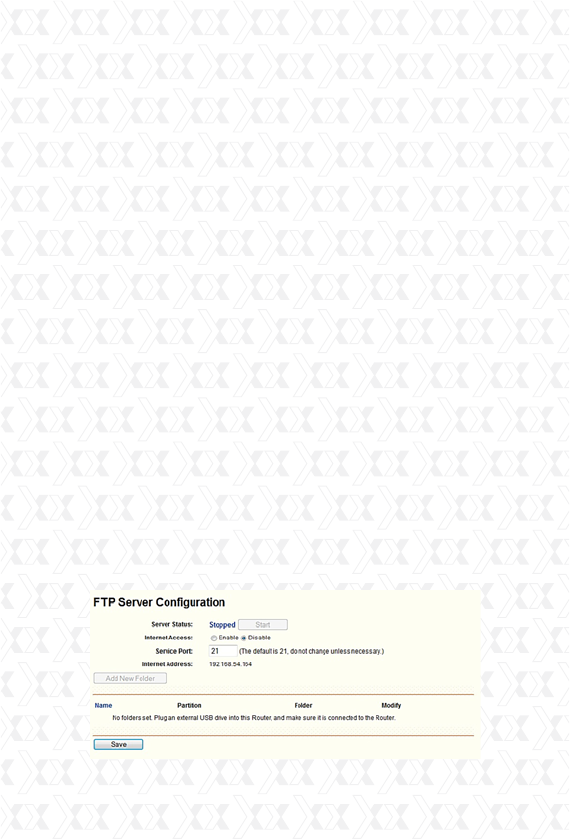
Nexxt Solutions - ACRUX - Wireless N Gigabit Router
71
Plug an external USB hard disk drive or USB flash
drive into this Router.
Click the Enable/Disable radio box to enable/
disable internet access to ftp from WAN port.
Change the Service port to specify a port for ftp
server to use (default 21).
The Internet Address displays the WAN IP
address of this router, so that others can access
ftp through this address.
If WAN type is PPPOE/PPTP/L2TP, there would
be two connections. Therefore, users can access
the ftp server via two connections. Users in a
private LAN can access ftp server via Public
Address while internet users can access ftp
server via Internet Address.
Click the Start button to start the ftp server.
4.8.2 FTP Server
You can configure a FTP server on this page.
Follow the instructions below to set up your FTP
server:
On this page, when a share folder is added, you can
view its display name, volume partition, folder path
and you can delete the share folder by clicking the
delete button.
1.
2.
3.
4.
5.
6.

Nexxt Solutions - ACRUX - Wireless N Gigabit Router
72
Plug an external USB hard disk drive or USB flash
drive into this Router.
Click the Start button to initiate the media server.
Click the Add share folder button to specify a
folder as the search path of media server.
Click the Scan All button to scan all the share
folders immediately. You can also select Auto-
scan and at same time choose the auto scan
interval time from the pull-down list, and then click
the Save button to save the new settings. In this
case, the media server will auto scan the share
folder.
Name - This folder’s display name.
Partition - The volume that the folder resides.
Folder - The real full path of the specified folder.
Modify - You can edit the share folder by clicking
the modify button.
Delete - You can delete the share folder by
clicking the delete button.
Note:
The max share folders number is 10. If you want to
share a new folder when the number has reached
10, you can delete a share folder and then add a
new one.
If you want to change the FTP settings, you need to
restart FTP Server to enable the Settings Change.
4.8.3 Media Server
You can configure media server on this page.
Follow the instructions below to set up your media
server:
1.
2.
3.
4.
s
s
s
s
s
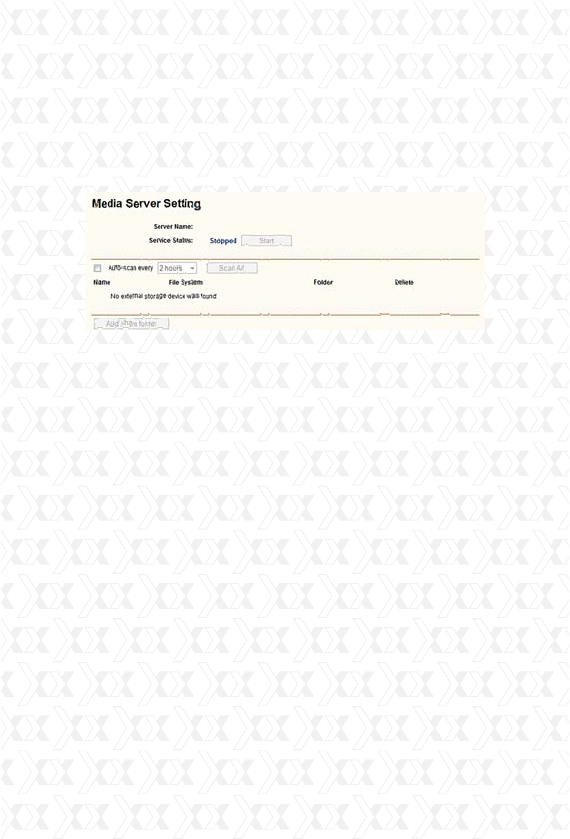
Nexxt Solutions - ACRUX - Wireless N Gigabit Router
73
On this page, when a share folder is added, you can
view its display name, file system type, folder path
and you can delete the share folder by clicking the
delete button as shown in the corresponding dialog
box.
Name - This folder’s display name.
File System - The file system on the partition can
be FAT32 or NTFS.
Folder - The real full path of the specified folder.
Delete - You can delete the share folder by
clicking the delete button.
s
s
s
s
Note:
The max. share folders number is 3. If you want to
share a new folder when the numbers have reached
to be 3, you can delete a share folder and then add
a new one.
Click the Start button to start the media server.
Click the Stop button to stop the media server.
Click the Scan All button to scan all the share
folders immediately.
Click the delete button to delete the specified share
folder.
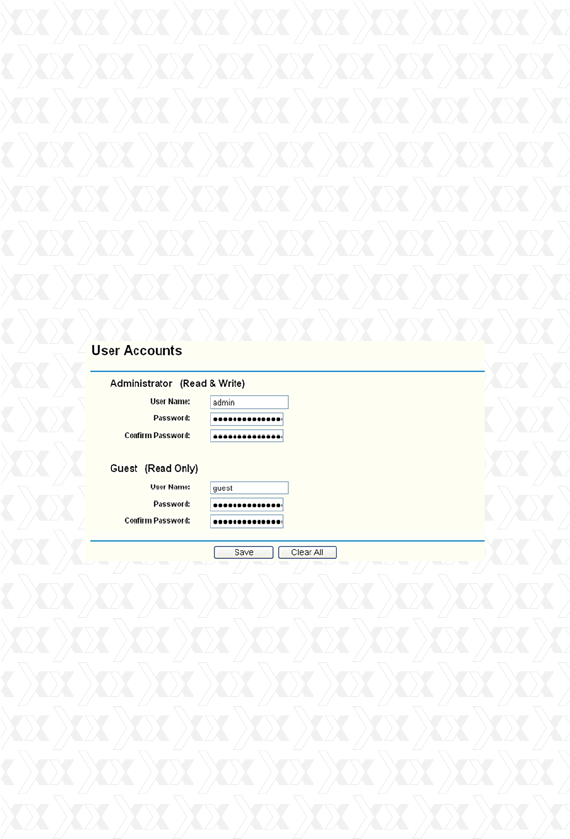
Nexxt Solutions - ACRUX - Wireless N Gigabit Router
74
4.8.4 User Accounts
You can specify the user name and password for
Network Sharing users on the following User
Accounts page. Network Sharing users can use
Internet Explorer to access files stored in the USB
drive. There are two Network Sharing users that
can access the shares. They are Administrator and
Guest. Administrator has read/write privileges while
Guest has read-only access.
Only Administrator can use a Web browser to
transfer the files from a PC to the Writable shared
volume on the USB drive.
Figure 4-32 User Accounts
User Name - Type the user name that you want
to give access to the USB drive. The user name
should consist of alphanumeric characters, not
exceeding 15 in length.
Password - Enter the password in the Password
field. The password should consist of alphanu-
meric characters, not exceeding 15 in length. For
security purposes, the password for each user
*
*
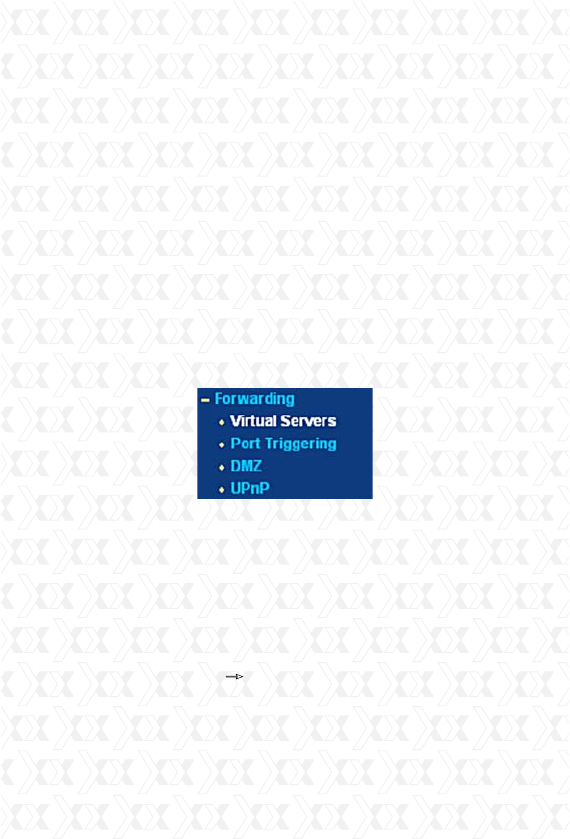
Nexxt Solutions - ACRUX - Wireless N Gigabit Router
75
*
1.
2.
account is not displayed.
Confirm Password - Re-enter the password here.
Please restart the service for the new settings to
take effect.
If you cannot use the new user name and
password to access the shares, press Windows
logo + R to open the Run dialog box. Next, net
use \\192.168.0.1/delete/yes and press Enter.
(192.168.0.1 is your Router’s LAN IP address.)
Click the Save button to store your settings.
Click the Clear All button to clear all the fields.
Note:
There are four submenus under Forwarding (shown
in Figure 4-33): Virtual Servers, Port Triggering,
DMZ and UPnP. Click on any of these items in
order to configure the corresponding function.
4.9.1 Virtual Servers
Go to “Forwarding Virtual Servers” in the menu,
in order to visualize and add virtual servers, as
shown in the following screen (Figure 4-34). Virtual
servers can be used for setting up public services
on your LAN, such as DNS, Email and FTP. A virtual
4.9 Forwarding
Figure 4-33 The Forwarding menu
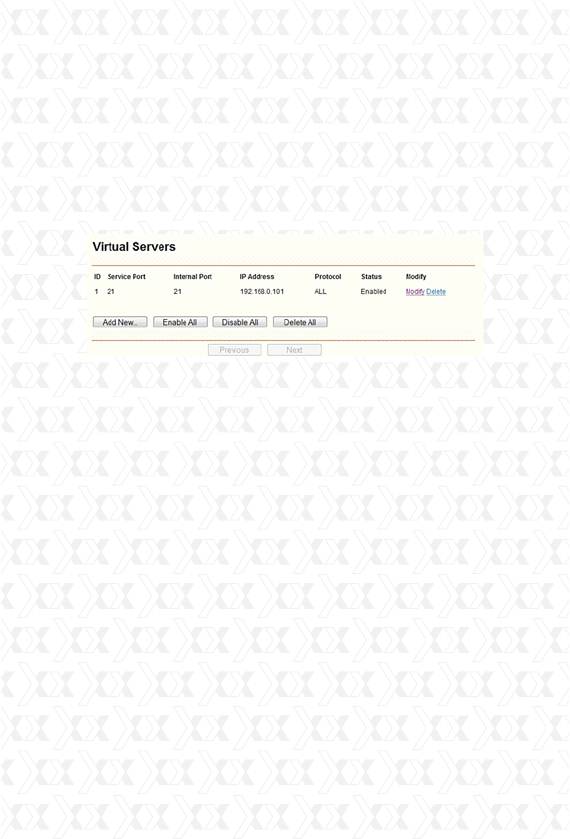
Nexxt Solutions - ACRUX - Wireless N Gigabit Router
76
*
*
*
*
*
Service Port - The numbers of External Ports.
You can type a service port or a range of service
ports (in XXX – YYY format, XXX is the start port
number, YYY is the end port number).
IP Address - The IP Address of the PC providing
the service application.
Internal Port - The Internal Service Port number
of the PC running the service application. You can
leave it blank if the Internal Port is the same as
the Service Port, or enter a specific port number
when Service Port is a single one.
Protocol - The protocol used for this application,
either TCP, UDP, or All (all protocols supported
by the router).
Status - This field displays either Enabled or
Disabled, as the current status for the device.
Figure 4-34 Virtual Servers
server is defined as a service port, and all
requests from the Internet to this service port will
be redirected to the computer specified by the
server IP. Any PC that was used for a virtual server
must have a static or reserved IP Address because
its IP Address may be changed when using the
DHCP function.
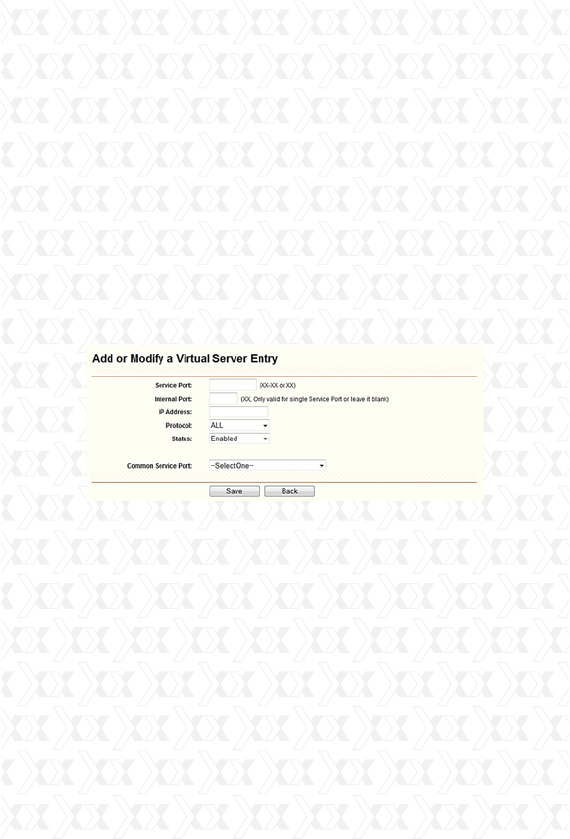
Nexxt Solutions - ACRUX - Wireless N Gigabit Router
77
1.
2.
3.
4.
5.
6.
1.
2.
3.
Click the “Add New…” button (as in Figure 4-35).
Select the service you want to use from the
Common Service Port list. If the Common Service
Port list does not have the service that you want
to use, type the number of the service port or
service port range in the Service Port box.
Type the IP Address of the computer in the IP
Address box.
Select the protocol used for this application,
either TCP or UDP, or All.
Click on the check box to Enable the virtual server.
Click the Save button.
Click the Modify button next to in the entry you
want to change. If you want to erase this entry,
click on Delete.
Proceed with the changes you want to make.
Click the Save button.
Note:
If your computer or server has more than one type
of service available, please select a different service,
and enter the same IP Address for that computer or
server.
To modify or delete an existing entry:
To setup a virtual server entry:
Figure 4-35 Add or Modify a Virtual Server Entry
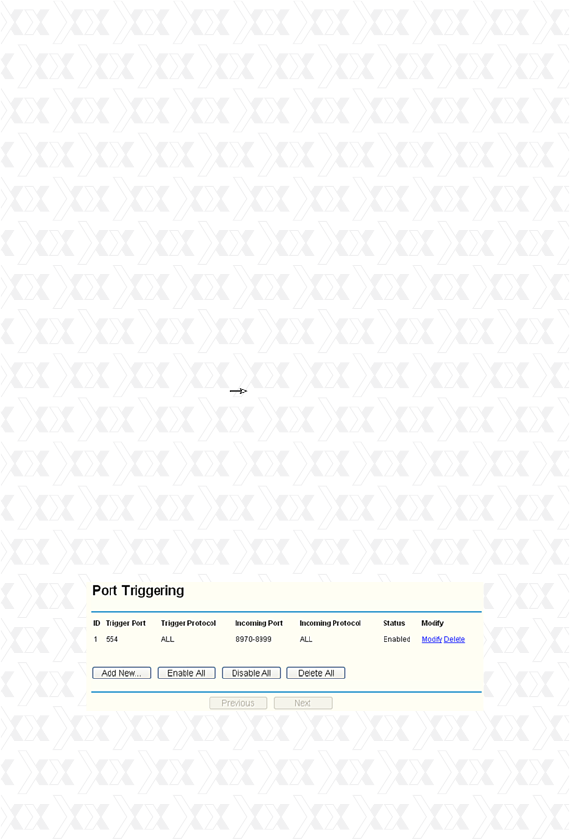
Nexxt Solutions - ACRUX - Wireless N Gigabit Router
78
Click the Enable All button to activate all entries
Click the Disabled All button to cancel all entries.
Click the Delete All button to erase all entries
Click the Next button to go to the following page
Click the Previous button to return to the last page.
Note:
If you set the service port of the virtual server as
80, you must set the Web management port on
System Tools –> Remote Management page to be
any other value except 80, such as 8080.
Otherwise, there will be a conflict to disable the
virtual server.
4.9.2 Port Triggering
Go to “Forwarding Port Triggering” in the menu,
in order to visualize and add port triggering, as
shown in the next screen (Figure 4-36). Some
applications require multiple connections, like
Internet games, video conferencing, Internet calling,
and so on. These applications cannot work with a
pure NAT router. Port Triggering is used for some
of these applications to let them work with a NAT
router.
Figure 4-36 Port Triggering

Nexxt Solutions - ACRUX - Wireless N Gigabit Router
79
Once the Router is configured, the operation is as
follows:
1.
2.
3.
A local host makes an outgoing connection using
a destination port number defined in the Trigger
Port field.
The Router records this connection, opens the
incoming port or ports associated with this entry
in the Port Triggering table, and associates them
with the local host.
When necessary the external host will be able to
connect to the local host using one of the ports
defined in the Incoming Ports field.
Trigger Port - The port for outgoing traffic. An
outgoing connection using this port will “Trigger”
this rule.
Trigger Protocol - The protocol used for Trigger
Ports, either TCP, UDP, or All (all protocols
supported by the router).
Incoming Ports Range - The port or port range
used by the remote system when it responds to
the outgoing request. A response using one of
these ports will be forwarded to the PC that
triggered this rule. You can input at most 5
groups of ports (or port section). Every group of
ports must be set apart with “,”. For example,
2000-2038, 2050-2051, 2085, 3010-3030.
Incoming Protocol - The protocol used for
Incoming Ports Range, either TCP or UDP, or
ALL (all protocols supported by the router).
Status - It displays the current status of this
entry, either Enabled or Disabled.
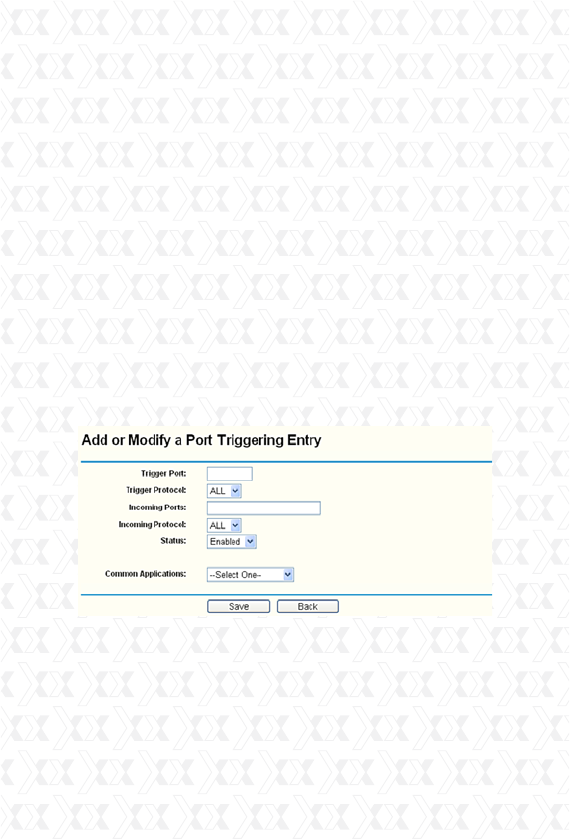
Nexxt Solutions - ACRUX - Wireless N Gigabit Router
80
To add a new rule, follow the steps below.
To modify or delete an existing entry:
1.
2.
3.
4.
5.
6.
1.
2.
3.
Click the “Add New…” button. The following
screen will be displayed, as shown in Figure 4-37.
Select a common application from the Common
Applications drop-down list, then the Trigger Port
field and the Incoming Ports field will be automati-
cally filled. If the Common Applications do not have
the application you need, enter the Trigger Port
and the Incoming Ports manually.
Select the protocol used for Trigger Port from the
Trigger Protocol drop-down list, either TCP, UDP,
or All.
Select the protocol used for Incoming Ports from
the Incoming Protocol drop-down list, either TCP
or UDP, or All.
Select Enable in Status field.
Click the Save button to store the new rule.
Click the Modify button next to in the entry you
want to change. If you want to erase this entry,
click on Delete.
Proceed with the changes you want to make.
Click the Save button.
Figure 4-37 Add or Modify a Triggering Entry
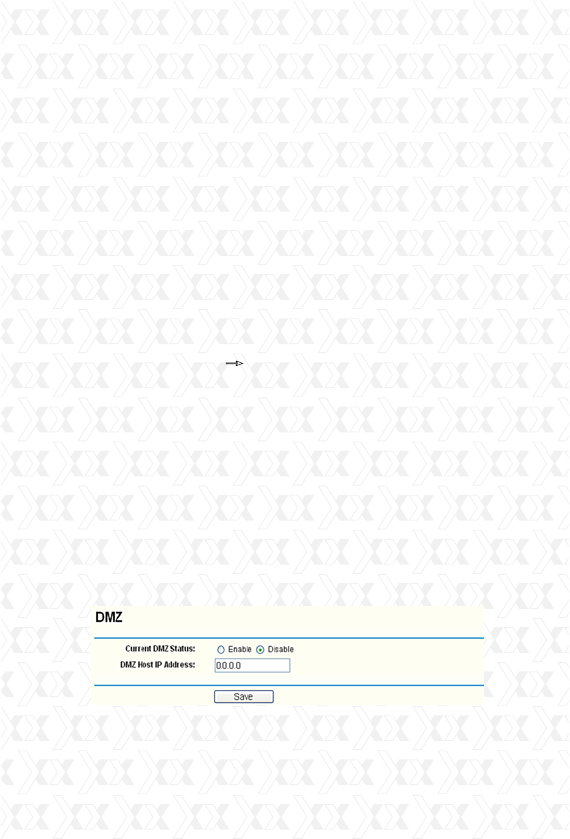
Nexxt Solutions - ACRUX - Wireless N Gigabit Router
81
Click the Enable All button to activate all entries.
Click the Disabled All button to cancel all entries.
Click the Delete All button to erase all entries.
Note:
4.9.3 DMZ (Demilitarized Zone)
Go to “Forwarding DMZ”, in order to visualize and
configure the DMZ host, as shown in the screen
below (Figure 4-38). The DMZ host feature allows
one local host to be exposed to the Internet so as to
gain access to certain applications, such as Internet
gaming or videoconferencing. DMZ host forwards all
the ports at the same time. Any PC whose port is
being forwarded must have its DHCP client function
disabled, and should also have a new static IP
Address assigned to it, because its IP Address may
be changed when using the DHCP function.
1.
2.
3.
When the trigger connection is released, the
corresponding opened ports will be closed.
Each rule allows only to be used by a single host
on LAN synchronously. The trigger connection of
other hosts on LAN will be refused.
Incoming Port Range cannot overlap each other.
Figure 4-38 DMZ
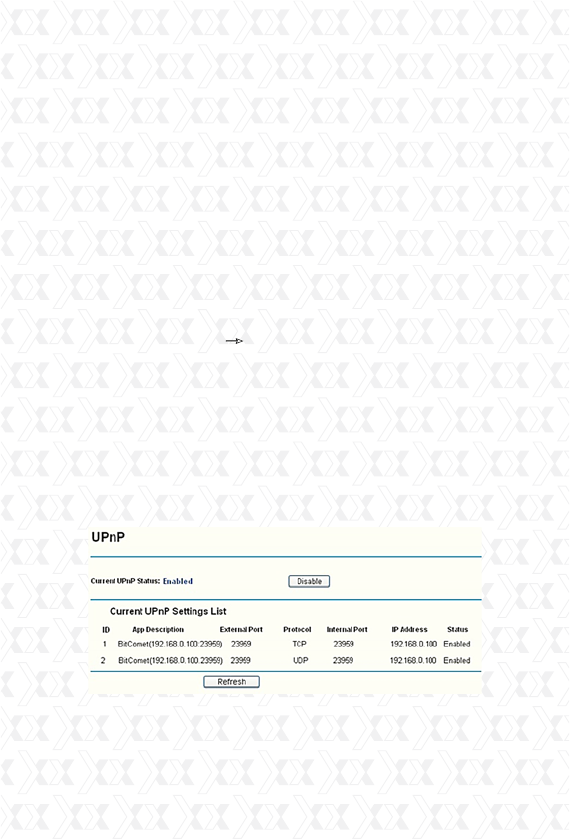
Nexxt Solutions - ACRUX - Wireless N Gigabit Router
82
Note:
Once you set the DMZ host, the firewall protection
for that host will be disabled.
4.9.4 UPnP
Go to “Forwarding UPnP” in the menu, in order
to visualize the information related to the UPnP
(Universal Plug and Play) feature, as shown in the
screen below (Figure 4-39). The UPnP architecture
allows any compatible device, such as Internet com-
puters, to access the local host resources or other
networking equipment, as needed. UPnP devices on
the LAN can be automatically discovered using the
UPnP application.
To assign a computer or server to be a DMZ
server:
1.
2.
3.
Click the Enable radio button
Enter the local host IP Address in the DMZ Host
IP Address field.
Click the Save button.
Figure 4-39 UPnP Setting
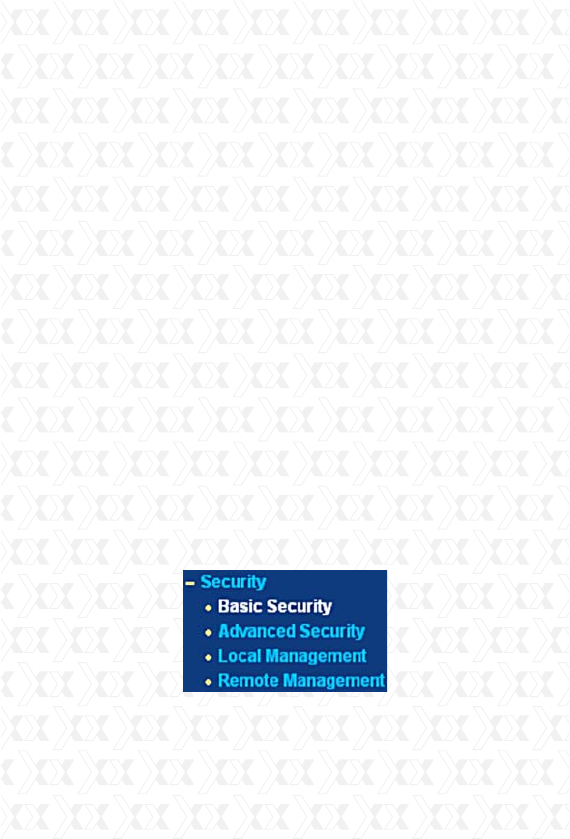
Nexxt Solutions - ACRUX - Wireless N Gigabit Router
83
*
*
Current UPnP Status - UPnP can be enabled or
disabled by clicking the Enable or Disable button.
Please note that since this feature is enabled by
default, it may present a risk to security.
Current UPnP Settings List - This table displays
the current UPnP information.
Click Refresh to update the Current UPnP Settings
List.
4.10 Security
App Description - The description provided by
the application in the UPnP request.
External Port - External port, which the router
opened for the application.
Protocol - Shows which type of protocol is
opened.
Internal Port - Internal port, which the router
opened for local host.
IP Address - The UPnP device that is currently
accessing the router.
Status - The port status is displayed in this field.
“Enabled” means that the port is still active.
Otherwise, the port is inactive.
s
s
s
s
s
s
Figure 4-40 Security menu
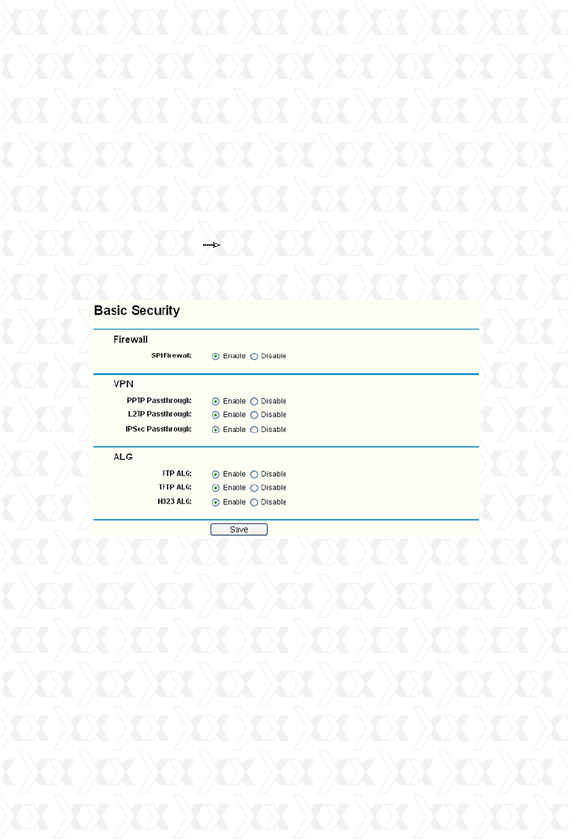
Nexxt Solutions - ACRUX - Wireless N Gigabit Router
84
*Firewall - A firewall protects your network from
the outside world. In this page, the user can
enable or disable the router firewall.
SPI Firewall - SPI (Stateful Packet Inspection,
also known as dynamic packet filtering) helps to
prevent cyber attacks by tracking more state
per session. It validates that the traffic passing
through the session conforms to the protocol.
SPI Firewall is enabled by factory default. If you
There are four submenus under the Security (shown
in Figure 4-40): Basic Security, Advanced Security,
Local Management and Remote Management.
Click on any of these items in order to configure the
corresponding function.
4.10.1 Basic Security
Go to “Security Basic Security”, in order to
configure the basic security settings, as shown in
the screen below (Figure 4-37).
s
Figure 4-41 Basic Security

Nexxt Solutions - ACRUX - Wireless N Gigabit Router
85
want all the computers on the LAN exposed to
the outside world, you can disable it. enable or
disable the router firewall.
PPTP Passthrough - Point-to-Point Tunneling
Protocol (PPTP) allows the Point-to-Point
Protocol (PPP) to be tunneled through an IP
network. To allow PPTP tunnels to pass through
the router, keep its default configuration:
Enabled.
L2TP Passthrough - Layer 2 Tunneling
Protocol (L2TP) is the method used to enable
Point-to-Point sessions via the Internet on the
Layer 2 level. To allow L2TP tunnels to pass
through the router, keep its default configuration:
Enabled.
IPSec Passthrough - Internet Protocol
Security (IPSec) is a suite of protocols for
ensuring private, secure communications over
Internet Protocol (IP) networks, through the use
of cryptographic security services. To allow IPSec
tunnels to pass through the router, keep its
default configuration: Enabled.
s
s
s
*
*
VNP - VPN Passthrough must be enabled if you
want to allow VPN tunnels using IPSec, PPTP,
or L2TP protocols to pass through the Router’s
firewall.
ALG - It is recommended to enable Application
Layer Gateway (ALG) because it allows
customized Network Address Translation (NAT)
traversal filters to be plugged into the gateway,
so as to support address and port translation
for certain application layer “control/data”
protocols, such as FTP, TFTP, H323 etc.
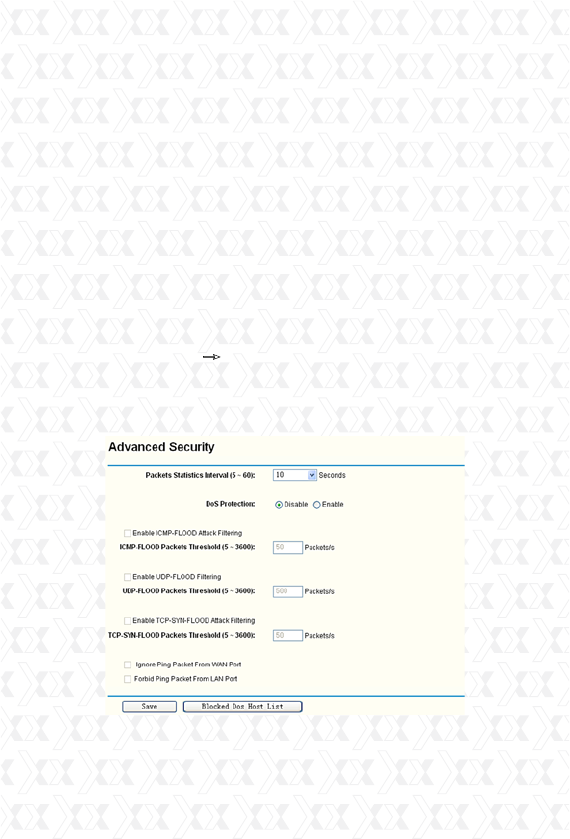
Nexxt Solutions - ACRUX - Wireless N Gigabit Router
86
Click the Save button to store your settings.
4.10.2 Advanced Security
Go to “Security Advanced Security” in the menu,
in order to protect the router from being attacked
by TCP-SYN Flood, UDP Flood and ICMP-Flood, as
shown in the following screen (Figure 4-42).
FTP ALG - To allow FTP clients and servers
to transfer data across NAT, keep its default
configuration: Enabled.
TFTP ALG - To allow TFTP clients and servers
to transfer data across NAT, keep its default
configuration: Enabled.
H323 ALG - To allow Microsoft NetMeeting
clients to communicate across NAT, keep its
default configuration: Enabled.
s
s
s
Figure 4-42 Advanced Security

Nexxt Solutions - ACRUX - Wireless N Gigabit Router
87
*
*
*
*
*
*
*
Packets Statistics Interval (5~60) - The default
value is 10. Select the desired setting between 5
and 60 seconds from the drop-down list. This value
determines the time interval between
packets. The result of the statistics is used for
analysis by SYN Flood, UDP Flood and ICMP-Flood.
DoS Protection - Denial of Service protection.
Check the corresponding box to Enable or Disable
this function. Only when DoS is enabled, flood filters
will be effective.
Note:
You must first enable Traffic Statistics in “System
Tool Traffic Statistics” for the DoS Protection
feature to work.
Enable ICMP-FLOOD Attack Filtering – Check this
box to Enable or Disable the ICMP-FLOOD Attack
Filtering.
ICMP-FLOOD Packets Threshold (5~3600) - The
default value is 50. Select the desired setting 5
~ 3600. When the current ICMP-FLOOD Packets
number exceeds the set value, the router will im-
mediately startup the blocking feature.
Enable UDP-FLOOD Filtering - Enable or Disable
the UDP-FLOOD Filtering.
UDP-FLOOD Packets Threshold (5~3600) - The
default value is 500. Select the desired setting
between 5 ~ 3600. When the current UPD-FLOOD
Packets number exceeds the set value, the router
will immediately startup the blocking feature.
Enable TCP-SYN-FLOOD Attack Filtering - Check
this box to Enable or Disable the TCP-SYN-FLOOD
Attack Filtering.

Nexxt Solutions - ACRUX - Wireless N Gigabit Router
88
Click the Save button to store the settings.
Click the DoS Host Block List button to display the
DoS host table with the items excluded.
4.10.3 Local Management
Go to “Security Local Management” in the menu,
in order to configure the management rule as shown
in the screen below (Figure 4-43). The management
feature allows you to deny computers in the LAN
from accessing the Router.
*
*
*
TCP-SYN-FLOOD Packets Threshold (5~3600) -
The default value is 50. Select the desired setting
between 5 ~ 3600. When the current TCP-SYN-
FLOOD Packets number exceeds the set value, the
router will immediate startup the blocking feature.
Ignore Ping Packet From WAN Port - Check this
box to Enable or Disable this option. The default
setting is disabled. If enabled, the ping packet
from the Internet cannot access the router.
Forbid Ping Packet From LAN Port - Check this
box to Enable or Disable this option. The default
setting is disabled. If enabled, the ping packet
from LAN cannot access the router. This function
can be used to defend the network against some
viruses.
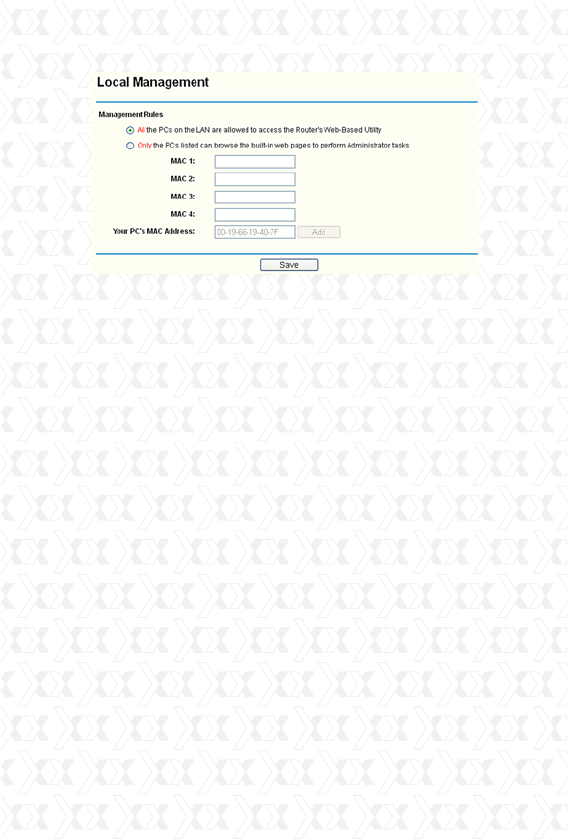
Nexxt Solutions - ACRUX - Wireless N Gigabit Router
89
Figure 4-43 Local Management
By default, the radio button “All the PCs on the
LAN are allowed to access the Router’s Web-
Based Utility” is checked. If you want to allow PCs
with specific MAC Addresses to access the Setup
page of the Router’s Web-Based Utility locally from
inside the network, check the radio button “Only the
PCs listed can browse the built-in web pages to
perform Administrator tasks”, and then enter each
MAC Address in a separate field. The format for the
MAC Address is XX-XX-XX-XX-XX-XX (where X is any
hexadecimal digit). Only the PCs with a MAC address
listed can use the password to browse the built-in
web pages to perform Administrator tasks while all
the others will be blocked.
After clicking the Add button, your PC’s MAC
Address will be placed in the above list.
Click the Save button to store your settings.
Note:
If your PC is blocked but you want to access the
router again, use a pin to press and hold the Reset
Button (hole) on the back panel for about 5 seconds,
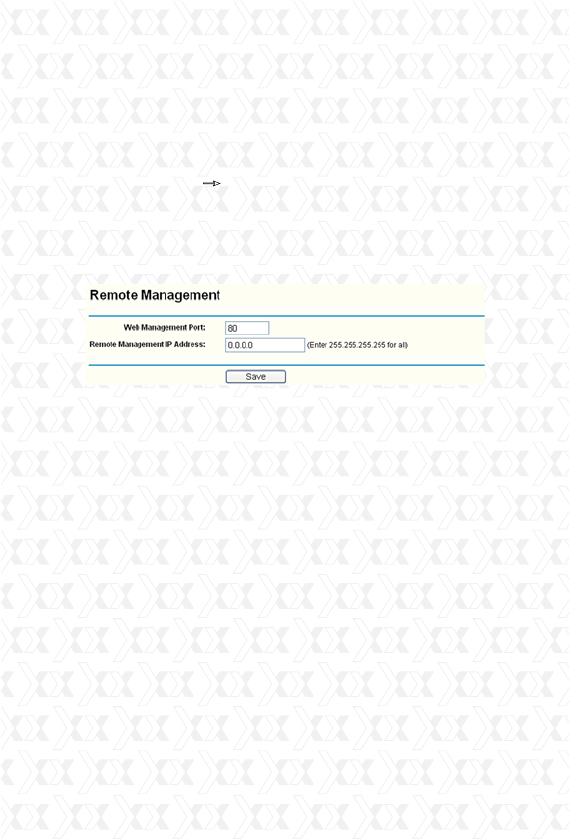
Nexxt Solutions - ACRUX - Wireless N Gigabit Router
90
Figure 4-44 Remote Management
to reset the router to its factory default values on
the Web-Based Utility.
4.10.4 Remote Management
Go to “Security Remote Management” in the
menu, in order to configure the Remote Manage-
ment feature, as shown in the screen below (Figure
4-44). This feature allows you to manage your
router from a remote location via the Internet.
*
*
Web Management Port - Web browser normally
uses the standard HTTP port 80 for access.
This router’s default remote management web
port number is 80. For greater security, you
can change the remote management web port
to a custom port by entering that number in the
box provided. Choose a number between 1 and
65534, but do not use the number of any
common service port.
Remote Management IP Address - This is the
current address you will use when accessing your
Router from the Internet. This function is disabled
when the IP address is set to the default value of
0.0.0.0. To enable this function change 0.0.0.0
to a valid IP address. If set to 255.255.255.255,
then all the hosts can access the Router from
internet.
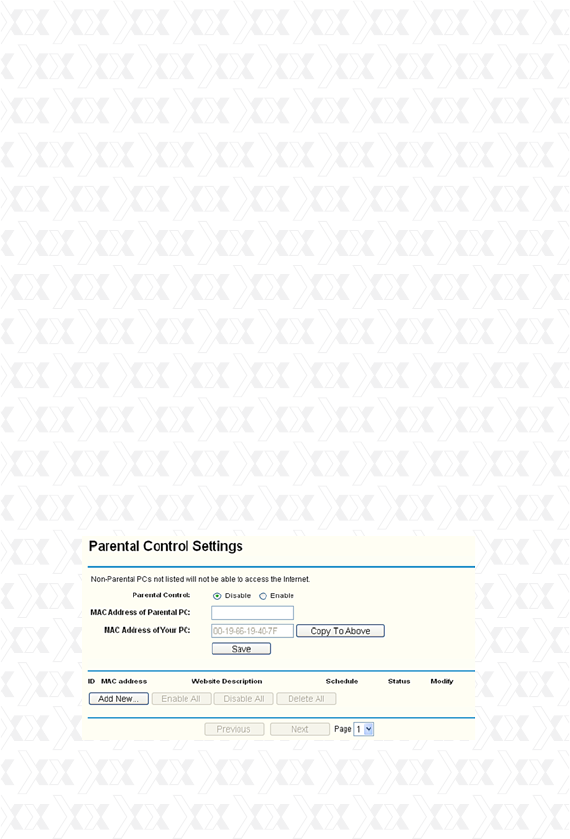
Nexxt Solutions - ACRUX - Wireless N Gigabit Router
91
Note:
1)
2)
To access the Router, you should type your
Router’s WAN IP address into your browser’s
address (in IE) or Location (in Navigator) box,
followed by a colon and the custom port num-
ber. For example, if your Router’s WAN address
is 202.96.12.8, and the port number used is
8080, please enter http://202.96.12.8:8080
in your browser. Later, you may be asked to type
the Router’s password. After successfully entering
the username and password, you will be able to
access the router’s web-based utility.
Be sure to change the router’s default password
to a more secure password.
4.11 Parental Control
Go to “Parental Control” in order to configure this
monitoring feature, as shown it the screen below.
(Figure 4-45). Parental Control can be used to
monitor the internet activities of a child, limit his/
her access to certain websites and to restrict the
amount of time they spend surfing.
Figure 4-45 Parental Control Settings

Nexxt Solutions - ACRUX - Wireless N Gigabit Router
92
1.
2.
3.
4.
*
*
*
*
*
*
Parental Control - Check Enable if you want to
activate this function; otherwise, check Disable.
MAC Address of Parental PC - In this field, enter
the MAC address of the monitoring PC, or you
can make use of the Copy To Above button below.
MAC Address of Your PC - This field displays the
MAC address of the PC that is managing this
router. If the MAC Address of your adapter is reg-
istered, you can click the Copy To Above button
to enter this address into the MAC Address of
Parental PC field above.
Website Description - Description of the allowed
website for the monitored PC.
Schedule - The time period allowed for the
monitored PC to have access to the Internet.
For detailed information, please go to “Access
Control Schedule”.
Modify – Use this link to edit or delete an existing
entry.
Click the Add New button. The screen shown in
figure 4-46 below will appear.
In the MAC Address of Child PC field, enter the
MAC address of the PC (e.g. 00-11-22-33-44-
AA) you want to control. Or you can choose the
MAC address from the All Address in Current
LAN drop-down list.
Give a description (e.g. Allow Google) for the
website allowed to be accessed in the Website
Description field.
Enter the allowed domain name of the website,
either the full name or the keywords (e.g. google)
in the Allowed Domain Name field. Any domain
To add a new entry, please follow the steps below.
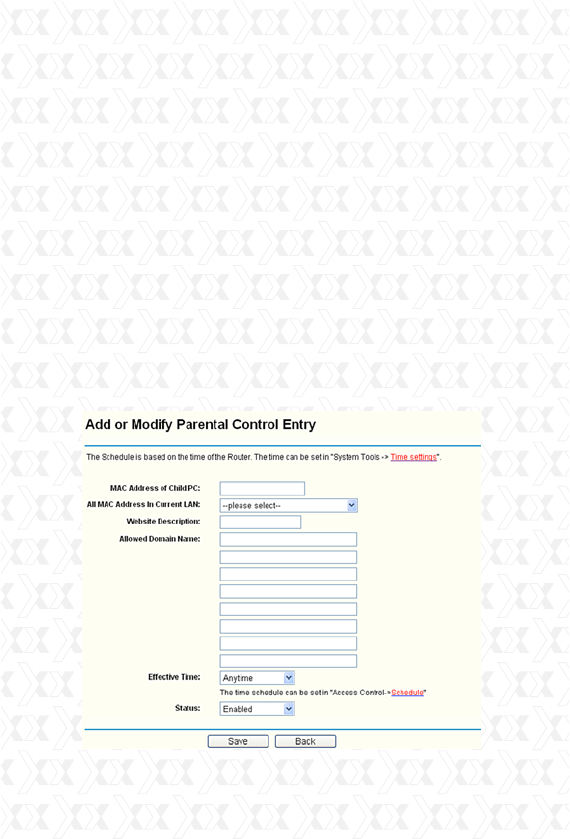
Nexxt Solutions - ACRUX - Wireless N Gigabit Router
93
name with keywords in it (www.google.com.cn) will
be allowed.
Select from the Effective Time drop-down list the
schedule (e.g. Schedule_1) you want the entry to
take effect. If there are not suitable schedules for
you, click the Schedule in red below to open the
Advanced Schedule Settings page, and create
the schedule you need.
In the Status field, select the Enabled or Disabled
condition for that entry.
Click the Save button.
Click the Enable All button to activate all entries.
Click the Disabled All button to cancel all entries.
Click the Delete All button to erase all entries.
Click the Next button to go to the following page
Click the Previous button to return to the last page.
5.
6.
7.
Figure 4-46 Add or Modify Parental Control Entry

Nexxt Solutions - ACRUX - Wireless N Gigabit Router
94
Click “Parental Control” menu on the left to enter
the Parental Control Settings page. Check Enable
and enter the MAC address 00-11-22-33-44-BB
in the MAC Address of Parental PC field.
Click “Access Control Schedule” on the left to
enter the Schedule Settings page. Click the Add
New button to create a new schedule, being
identified as Schedule_1. The day is Sat, and the
Time is all day-24 hours.
Click the “Parental Control” menu on the left to
go back to the Add or Modify Parental Control
Entry page:
4. Click Save to complete your settings.
Return to the Parental Control Settings page to
open the following list, as shown in figure 4-47.
For example: If you desire that the child PC with
MAC address 00-11-22-33-44-AA can access www.
google.com on Saturday only while the parent PC
with MAC address 00-11-22-33-44-BB is without
any restriction, you should follow the steps as de-
scribed below.
1.
2.
3.
Click the Add New button.
Enter 00-11-22-33-44-AA in the MAC Address
of Child PC field.
Enter “Allow Google” in the Website Description
field.
Enter “www.google.com” in the Allowed Domain
Name field.
Select the “Schedule_1” you just created from
the Effective Time drop-down list.
In Status field, select Enable.
s
s
s
s
s
s
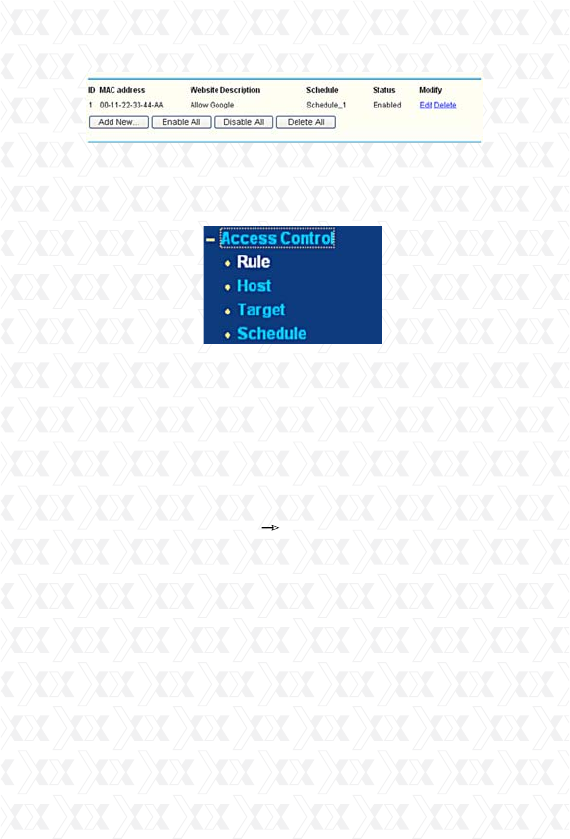
Nexxt Solutions - ACRUX - Wireless N Gigabit Router
95
4.12 Access Control
There are four submenus under Access Control
(Figure 4 48): Rule, Host, Target and Schedule.
Click on any of these items in order to configure the
corresponding function.
4.12.1 Rule
Go to “Access Control Rule”, in order to visualize
and set Access Control rules in the screen below, as
shown in Figure 4-49.
Figure 4-47 Parental Control Settings
Figure 4-48 Access Control
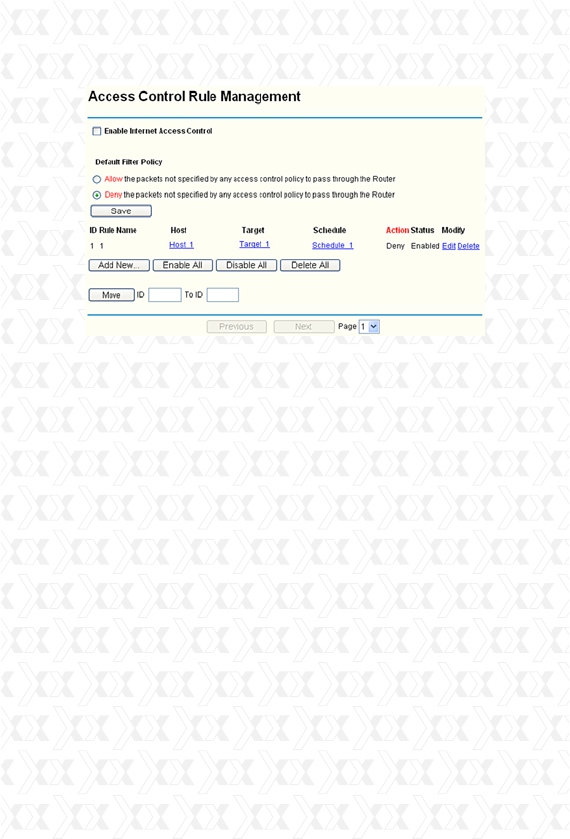
Nexxt Solutions - ACRUX - Wireless N Gigabit Router
96
Figure 4-49 Access Control Rule Management
Enable Internet Access Control - Check this box
to enable the Internet Access Control feature, so
that the Default Filter Policy can take effect.
Rule Name - The name of the rule is displayed
here, which is unique.
Host - The host selected with the corresponding
rule is displayed in this field.
Target - The target selected with the
corresponding rule is displayed in this field.
Schedule - The schedule selected with the
corresponding rule is displayed in this field.
Action - The action taken by the router to deal
with the packets is displayed here. It could be
Allow or Deny. Allow means that the router
permits the packets to pass through. Deny
means that the router is configured to reject the
packets.
Status - This field displays the current status of
the rule. Enabled means the rule will be applied.
*
*
*
*
*
*
*

Nexxt Solutions - ACRUX - Wireless N Gigabit Router
97
Disabled means the rule will not take effect.
Modify – Use this link to edit or delete an existing
rule.
Click the Add New button. The screen shown in
figure 4-50 below will appear.
Assign a name (e.g. Rule_1) to the rule in the
Rule Name field.
Select a host from the Host drop-down list, or
choose “Click Here To Add New Host List”.
Select a target from the Target drop-down list, or
choose “Click Here To Add New Target List”.
Select a schedule from the Schedule drop-down
list, or choose “Click Here To Add New Schedule”.
In the Action field, select Deny or Allow.
In the Status field, select the Enabled or Disabled
condition for that entry.
Click the Save button.
Click the Enable All button to activate all entries.
Click the Disabled All button to cancel all entries.
Click the Delete All button to erase all entries.
You can change the entry’s order as desired. Fore
entries are before hind entries. Enter the ID number
in the first box you want to move and another ID
number in second box you want to move to, and
then click the Move button to change the entry’s
order.
Click the Next button to go to the following page, or
click the Previous button to return to the last page.
*
1.
2.
3.
4.
5.
6.
7.
8.
To add a new rule, please follow the steps below.
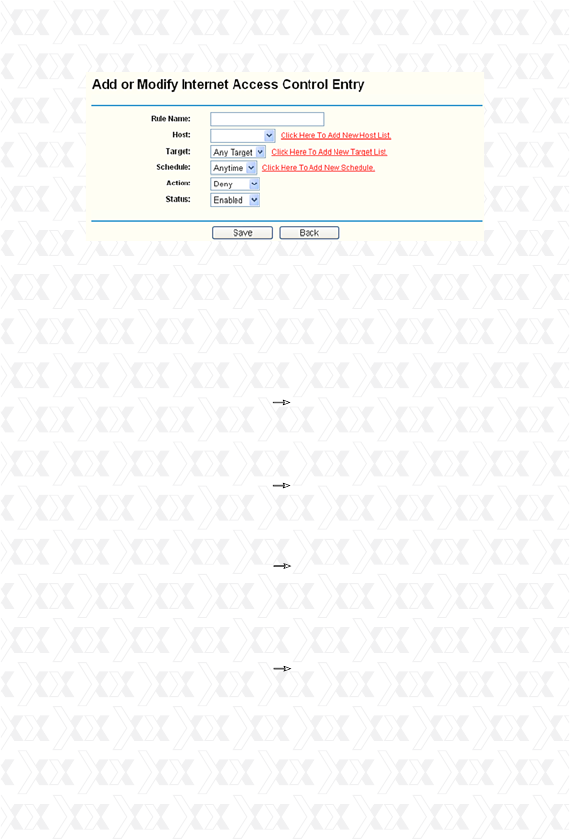
Nexxt Solutions - ACRUX - Wireless N Gigabit Router
98
Click “Access Control Host” on the left to open
the Host Settings page. Add a new entry identi-
fied as Host_1, using 00-11-22-33-44-AA as the
MAC Address.
Click “Access Control Target” on the left to
enter the Target Settings page. Add a new identi-
fied as Target_1, using www.google.com as the
Domain Name.
Click “Access Control Schedule” on the left to
open the Schedule Settings page. Add a new
entry identified as Schedule_1. The days are Sat
and Sun, Start Time is 1800 and Stop Time is
2000.
Click “Access Control Rule” on the left to
return to the Access Control Rule Management
page. Select “Enable Internet Access Control”
and choose “Deny the packets not specified by
any access control policy to pass through the
Router”.
For example: If you wish to allow the host with
MAC address 00-11-22-33-44-AA to access
www.google.com only from 18:00 to 20:00 on
Saturdays and Sundays, and forbid other hosts in
the LAN from accessing the Internet, you should
follow the steps as described below:
1.
2.
3.
4.
Figure 4-50 Add or Modify Internet Access Control Entry
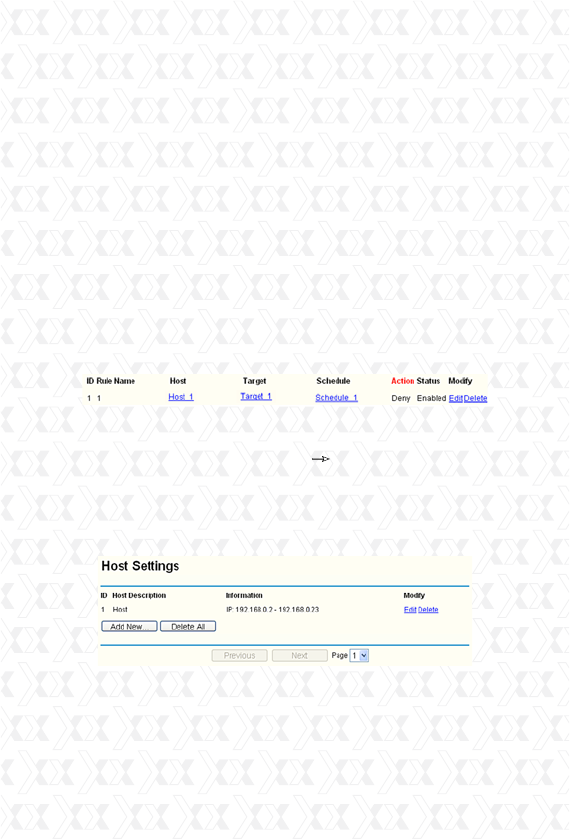
Nexxt Solutions - ACRUX - Wireless N Gigabit Router
99
Click the Add New button to insert a new rule as
follows:
Then you will go back to the Access Control Rule
Management page where the list below will be
displayed.
4.12.1.1.1. Host
Go to menu “Access Control Host”, in order to
visualize and set a Host list in the screen, as shown
in figure 4-51 below. The host list is necessary for
the Access Control Rule.
5.
In the Rule Name field, create a name for the
rule. Note that this name should be unique, for
example Rule_1.
In the Host field, select Host_1.
In the Target field, select Target_1.
In the Schedule field, select Schedule_1.
In the Action field, select Allow.
In the Status field, select Enable.
Click Save to complete your settings.
s
s
s
s
s
s
s
Figure 4-51 Host Settings
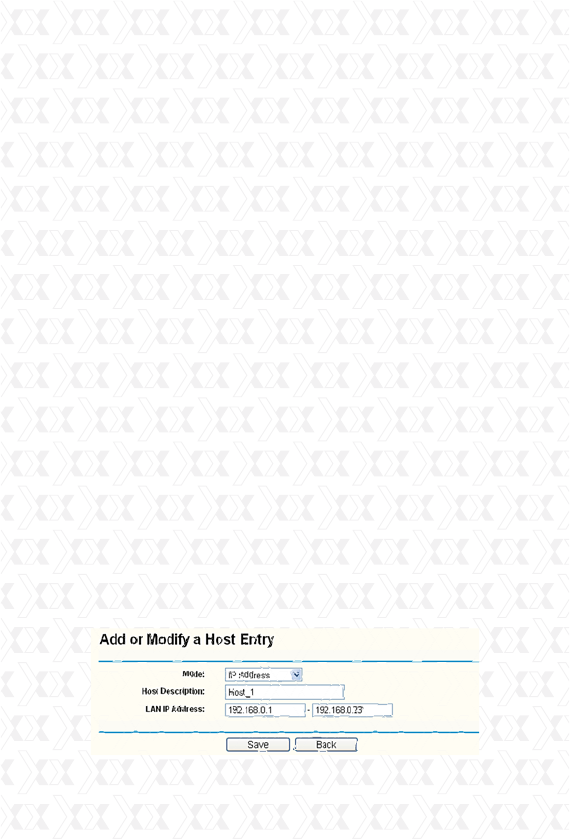
Nexxt Solutions - ACRUX - Wireless N Gigabit Router
100
If you select an IP Address, the screen shown in
figure 4-52 will be opened.
1) In the Host Description field, create a unique
description for the host (e.g. Host_1).
2) In the LAN IP Address field, enter the
IP address.
If you select the MAC Address, the screen
shown in figure 4-53 will be opened.
1) In the Host Description field, create a unique
description for the host (e.g. Host_1).
2) In the MAC Address field, enter the
corresponding address.
s
s
Figure 4-52 Add or Modify a Host Entry
Host Description - The description of the host,
which is unique, is displayed here.
Information - The data about the host is displayed
in this field. It can be IP or MAC.
Modify - Use this link edit or delete an existing
entry.
Click the Add New button.
In the Mode field, select IP Address or MAC
Address.
Click the Save button to complete your settings.
Click the Delete All button to erase all the entries in
the table.
Click the Next button to go to the following page, or
click the Previous button to return to the last page.
*
*
*
1.
2.
3.
To add a new entry, please follow the steps below.
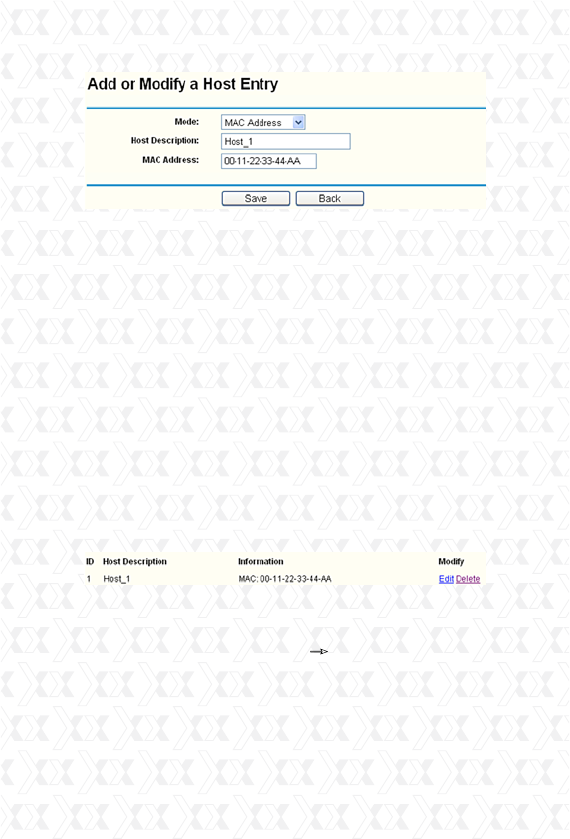
Nexxt Solutions - ACRUX - Wireless N Gigabit Router
101
Figure 4-53 Add or Modify a Host Entry
For example: If you wish to restrict the internet
activities of the host with MAC address 00-11-22-
33-44-AA, first you must complete the steps as
described below:
When done, you will return to the Host Settings
page, where the following list will be displayed.
4.12.2 Target
Go to menu “Access Control Target”, in order
to visualize and set a Target list, as shown in the
screen below (figure 4-54). The target list is
necessary for the Access Control Rule.
Click the Add New button in figure 4-51 to open
the Add or Modify a Host Entry page.
In the Mode field, select MAC Address from the
drop-down list.
In the Host Description field, create a unique
description for the host (e.g. Host_1).
In the MAC Address field, enter 00-11-22-33-44-AA.
Click Save to complete your settings.
1.
2.
3.
4.
5.
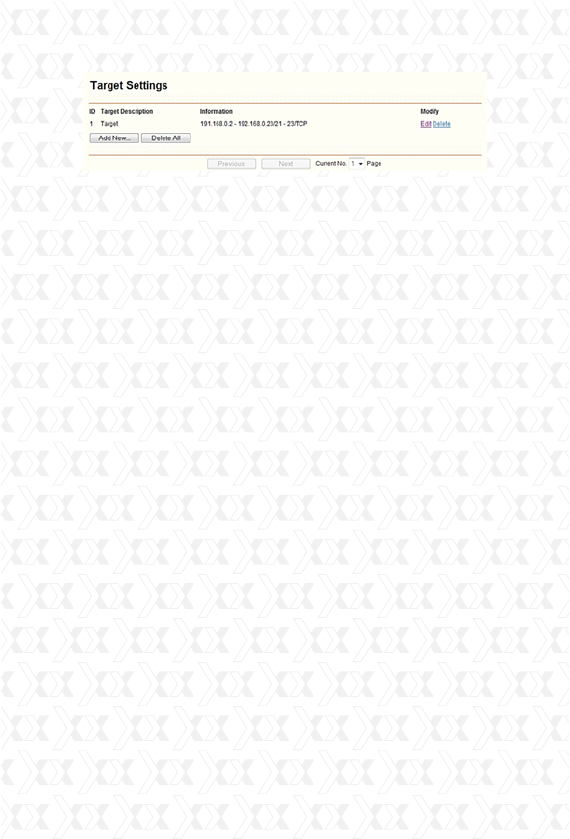
Nexxt Solutions - ACRUX - Wireless N Gigabit Router
102
Figure 4-54 Target Settings
Target Description - The target name, which is
unique, is displayed in this field.
Information - The target can be an IP address,
port, or domain name.
Modify - Use this link to edit or delete an existing
entry.
If you select IP Address, the screen shown is
figure 4-55 will be displayed.
1) In the Target Description field, create a
unique description for the target (e.g. Target_1).
2) In the IP Address field, enter the
corresponding address for the target.
3) Select a common service from the Common
Service Port from the drop-down list, so that
the Target Port will be automatically filled out. If
the Common Service Port drop-down list does
not have the service you want, specify the Target
Port manually.
4) In the Protocol field, select TCP, UDP, ICMP
or ALL.
If you select Domain Name, the screen shown in
figure 4-56 will be displayed.
1) In the Target Description field, create a
unique name for the target (e.g. Target_1).
To add a new entry, please follow the steps below.
1. Click the Add New button.
2. In the Mode field, select IP Address or Domain
Name.
*
*
*
s
s
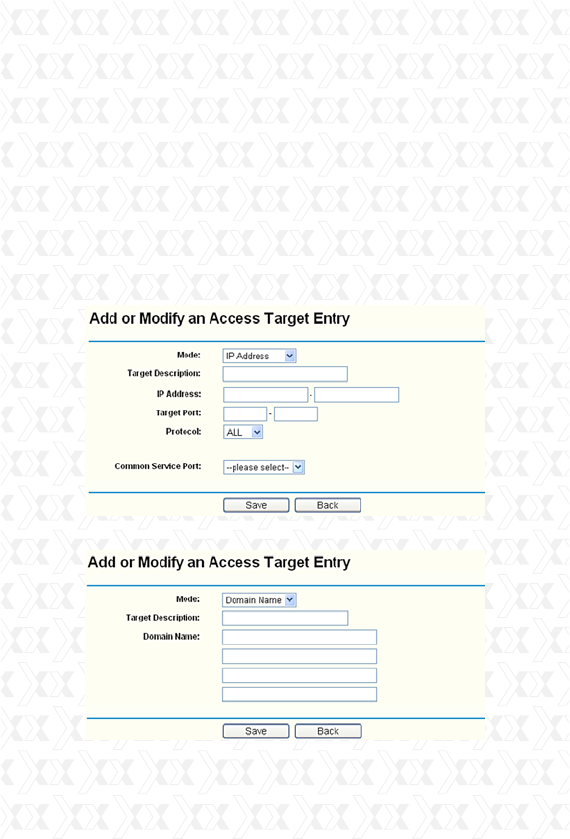
Nexxt Solutions - ACRUX - Wireless N Gigabit Router
103
2) Enter the domain name, either the full name
or the keywords (for example google) in the
Domain Name blank field. Any domain name with
keywords in it (www.google.com, www.google.cn)
will be blocked or allowed. You can enter up to 4
domain names.
Click the Save button.
Click the Delete All button to erase all the entries in
the table.
Click the Next button to go to the following page, or
click the Previous button return to the last page.
3.
Figure 4-55 Add or Modify an Access Target Entry
Figure 4-56 Add or Modify an Access Target Entry
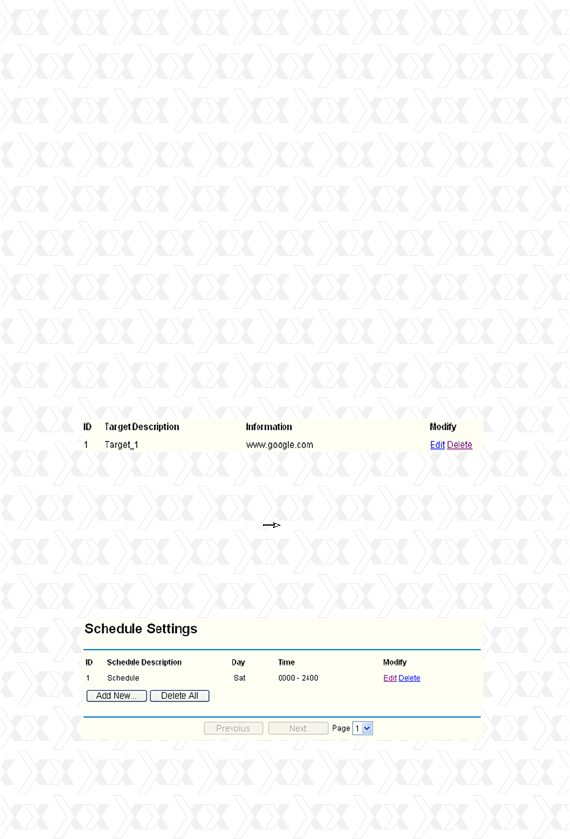
Nexxt Solutions - ACRUX - Wireless N Gigabit Router
104
For example: If you wish to restrict the internet
activities of the host with MAC address 00-11-22-
33-44-AA in the LAN, so that it is able to access
www.google.com only, first you must complete the
steps as described below.
Figure 4-57 Schedule Settings
Click the Add New button in figure 4 54 to open
the Add or Modify an Access Target Entry page.
In the Mode field, select Domain Name from the
drop-down list.
In the Target Description field, create a unique
description to identify the target (e.g. Target_1).
In the Domain Name field, enter www.google.
com.
Click Save to complete your settings.
When done, you will return to the Target Settings
page, where following list will be displayed.
4.12.3 Schedule
Go to “Access Control Schedule” in the menu, in
order to visualize and set a Schedule list in the next
screen, as shown in figure 4-57. The Schedule list
is necessary to establish the Access Control Rule.
1.
2.
3.
4.
5.
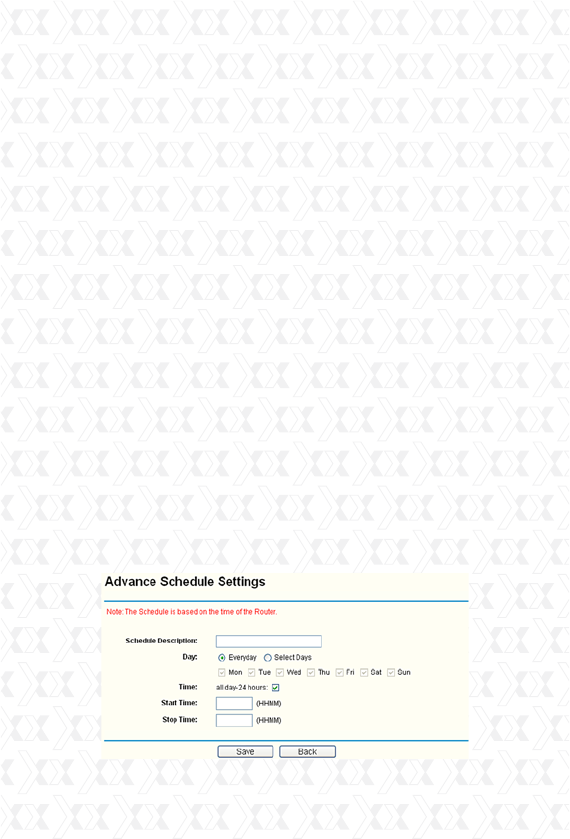
Nexxt Solutions - ACRUX - Wireless N Gigabit Router
105
Schedule Description - The name assigned to the
schedule, which is unique, is displayed in this field.
Day - The day(s) of the week is shown in this field.
Time - The 24-hour period of the day is displayed
in this field.
Modify – Use this link to edit or delete an existing
schedule.
Click the Add New button, as shown in figure
4-57. The screen displayed in figure 4-58 will
open in this step.
In the Schedule Description field, create a unique
name to identify the schedule (e.g. Schedule_1).
In the Day field, select the day or days you want
to include.
In the Time field, you can select all day-24 hours
or you may enter the Start Time and Stop Time in
the corresponding field.
Click Save to complete your settings.
Click the Delete All button to erase all the entries in
the table.
Click the Next button to go to the following page, or
click the Previous button return to the last page.
*
*
*
*
1.
2.
3.
4.
5.
To add a new schedule, follow the steps below.
Figure 4-58 Advanced Schedule Settings
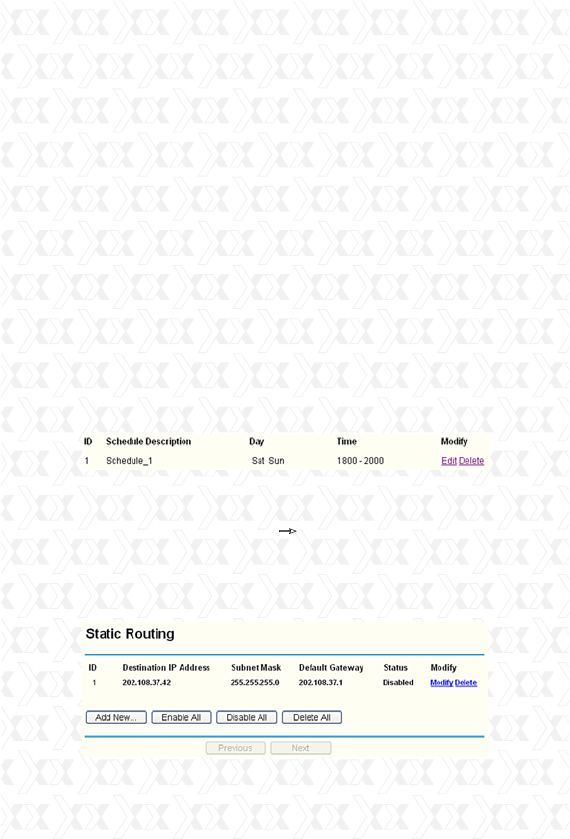
Nexxt Solutions - ACRUX - Wireless N Gigabit Router
106
Click the Add New button shown in figure 4-57 to
enter to the Advanced Schedule Settings page.
In the Schedule Description field, create a unique
name to identify the schedule (e.g. Schedule_1).
In the Day field, check the Select Days radio
button, and choose Sat and Sun next.
In the Time field, enter 1800 in the Start Time
field, and 2000 in the Stop Time field.
Click Save to complete your settings.
When done, you will return to the Schedule Settings
page, where following list will be displayed.
4.13 Static Routing
Go to Advanced Routing Static Routing List,
in order to configure the static route as shown in
the next screen (Figure 4-59). A static route is a
pre-determined path that network information must
travel to reach a specific host or network.
For example: If you wish to restrict the internet
activities of the host with MAC address 00-11-22-
33-44-AA, so that it is able to access www.google.
com only from 18:00 to 20:00 on Saturdays and
Sundays, you must first complete the steps as
described below:
1.
2.
3.
4.
5.
Figure 4-59 Static Routing
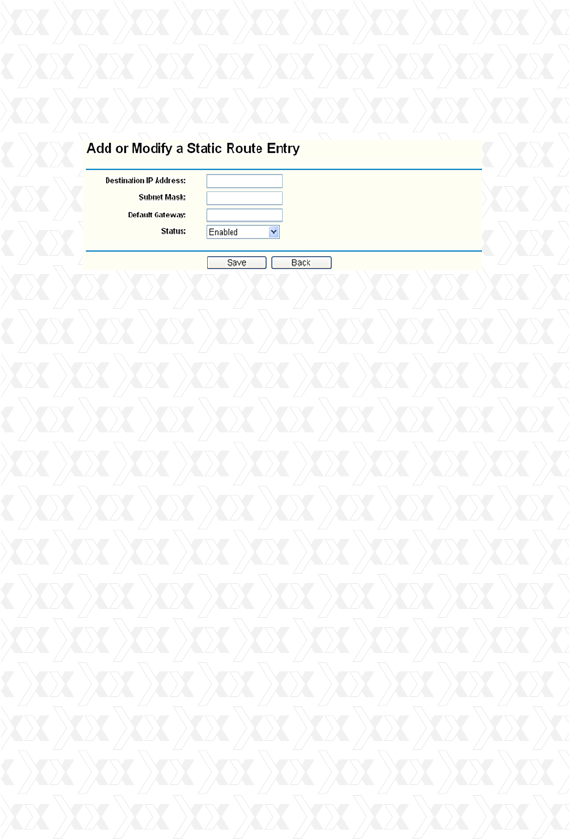
Nexxt Solutions - ACRUX - Wireless N Gigabit Router
107
To add static routing entries:
1. Click the Add New button as shown in figure
4-59. The following screen will open.
2. Enter the following data:
Figure 4-60 Add or Modify a Static Route Entry
Destination IP Address - The Destination IP
Address is the address of the network or host
that you want to assign a static route to.
Subnet Mask - The Subnet Mask determines
which portion of an IP Address is the network
portion, and which portion is the host portion.
Gateway - This is the IP Address of the gateway
device that allows for contact between the router
and the network or host.
3. Select Enabled or Disabled for this entry from
the Status pull-down list.
4. Click the Save button to make the entry
take effect.
Other configurations for the entries:
Click the Delete All button to erase all entries.
Click the Enable All button to activate all entries
Click the Disabled All button to cancel all entries.
*
*
*
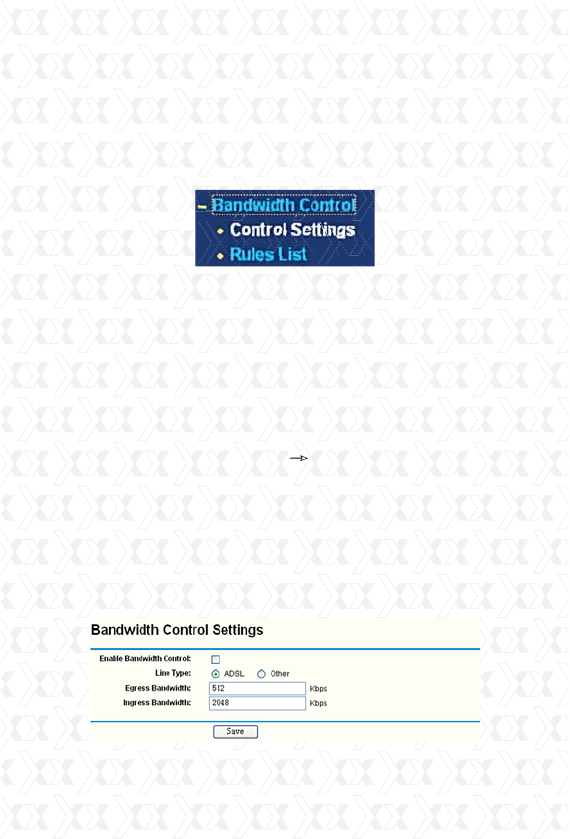
Nexxt Solutions - ACRUX - Wireless N Gigabit Router
108
Figure 4-62 Bandwidth Control Settings
Figure 4-61
Click the Previous button to view the information in
the last screen, click the Next button to view the
information in the following screen.
4.14 Bandwidth Control
There are two submenus under the Bandwidth Con-
trol menu as shown in Figure 4-57. Click on any of
these items in order to configure the corresponding
function. Below you will find detailed descriptions for
each of these items.
4.14.1 Control Settings
Go to “Bandwidth Control Control Settings”
in the menu, in order to configure the Egress and
Ingress Bandwidth using the screen shown below.
Enter the appropriate values in kbps, with settings
below 100000. For optimal control of the band-
width, please select the correct Line Type and ask
your ISP what is the maximum egress and ingress
bandwidth that can be set.
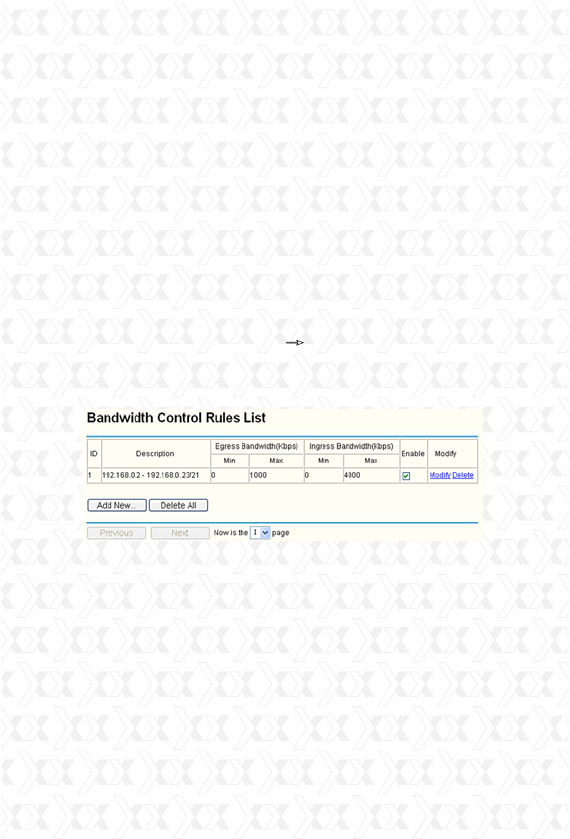
Nexxt Solutions - ACRUX - Wireless N Gigabit Router
109
Enable Bandwidth Control - Check this box so
that the Bandwidth Control settings can take
effect.
Line Type - Select the right type for you network
connection. If you are unsure about the type you
should choose, please contact your ISP directly to
find out.
Egress Bandwidth - The upload speed through
the WAN port.
Ingress Bandwidth - The download speed through
the WAN port.
Description - It displays information about the
rule, such as address range.
Egress bandwidth - This field displays the max
and min upload bandwidth through the WAN port,
the default is 0.
Ingress bandwidth - This field displays the max
and min download bandwidth through the WAN
port, the default is 0.
Enable - This field displays the status of the rule.
4.14.2 Rules List
Go to “Bandwidth Control Rules List” in the
menu, in order to visualize and configure the Band-
width Control rules in the screen below.
*
*
*
*
*
*
*
*
Figure 4-63 Bandwidth Control Rules List
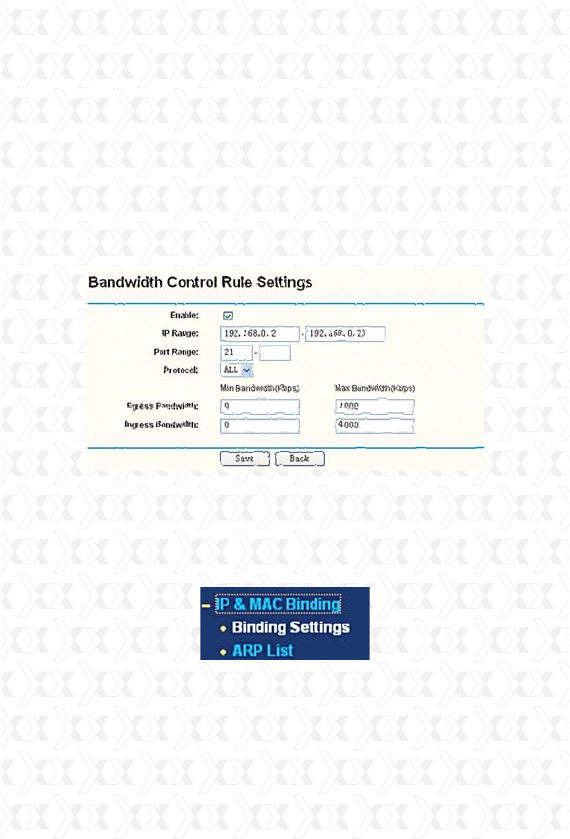
Nexxt Solutions - ACRUX - Wireless N Gigabit Router
110
Modify – Click the Modify link to edit the rule.
Click Delete link to erase the rule.
Step 1: Click the Add New button as shown in
figure 4-63. A new screen will open, just like the
one included in figure 4-64.
Step 2: Enter the information in the corresponding
fields.
Step 3: Click the Save button.
4.15 IP & MAC Binding Setting
There are two submenus under IP & MAC Binding
(shown in Figure 4-61): Binding Setting and ARP
List. Click on any of these items in order to scan
To add/modify a Bandwidth Control rule, follow
the steps below.
*
Figure 4-64 Bandwidth Control Rule Settings
Figure 4-65 IP & MAC Binding menu
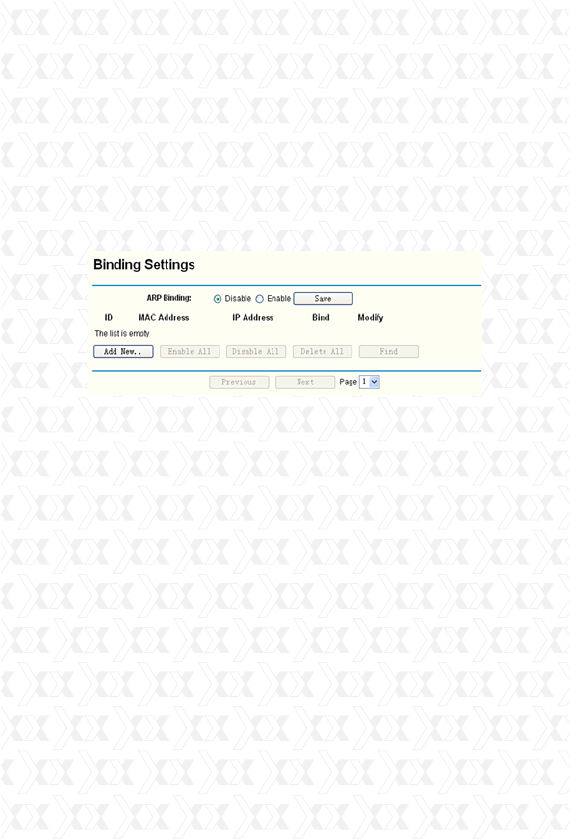
Nexxt Solutions - ACRUX - Wireless N Gigabit Router
111
or configure the corresponding function. Detailed
descriptions of each of these items are provided
below.
4.15.1 Binding Setting
This page displays the IP & MAC Binding Setting
table; which you can set up based on your individual
preferences (figure 4-66).
Figure 4-66 Binding Setting
MAC Address - The MAC address of the
monitored computer in the LAN.
IP Address - The assigned IP address of the
monitored computer in the LAN.
Bind - Check this option to enable ARP binding
for a specific device.
Modify – Use this link to edit or delete an existing
entry.
When you want to add or edit an IP & MAC Binding
entry, click the Add New button or Modify button,
and then you will be directed to the next page. This
page is used for adding or modifying an IP & MAC
Binding entry (shown in Figure 4-66).
*
*
*
*
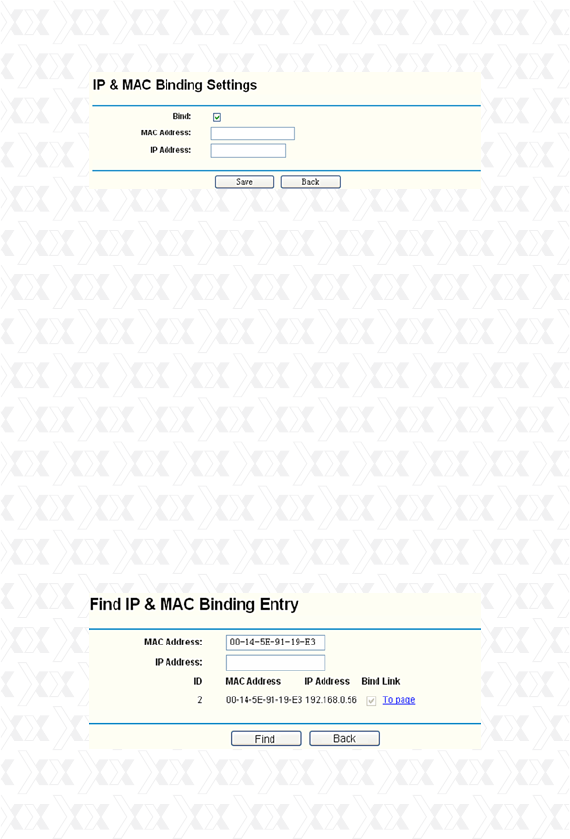
Nexxt Solutions - ACRUX - Wireless N Gigabit Router
112
Figure 4-67 IP & MAC Binding Setting (Add & Modify)
Figure 4-68 Find IP & MAC Binding Entry
To add IP & MAC Binding entries, follow the steps
below.
1.Click the Add New button, as shown in figure
4-67.
2.Enter the MAC Address and IP Address.
3.Select the Bind checkbox.
4.Click the Save button to accept your changes.
To modify or delete an existing entry, follow the
steps below.
1.Find the desired entry in the table.
2.Click Modify or Delete as desired on the Modify
column.
To find an existing entry, follow the steps below.
1.Click the Find button, as shown in figure 4-68.
2.Enter the MAC Address or IP Address.
3.Click the Find button in the page.
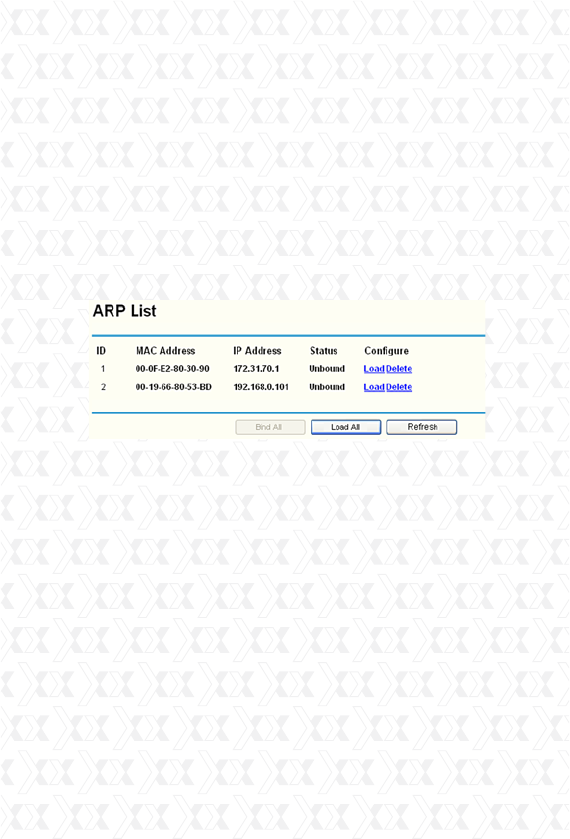
Nexxt Solutions - ACRUX - Wireless N Gigabit Router
113
Click the Enable All button to activate all entries.
Click the Delete All button to erase all entries.
4.15.2 ARP List
You can see IP addresses on the LAN and their
associated MAC addresses by viewing the ARP list.
Also, you can use the Load and Delete buttons to
manage the list. The user can use this list to
visualize all the existing IP & MAC binding entries
(shown in figure 4-69).
MAC Address - The MAC address of the
monitored computer in the LAN.
IP Address - The assigned IP address of the
monitored computer in the LAN.
Status - Indicates whether or not the MAC and
IP addresses are bound.
Configure – To load or delete an item.
sLoad - To load the item into the IP & MAC
Binding list.
sDelete - To erase the item.
Click the Bind All button to bind all the current
items. This option is only available when the ARP
binding is enabled.
Click the Load All button to include all items to the
Figure 4-69 ARP List
*
*
*
*

Nexxt Solutions - ACRUX - Wireless N Gigabit Router
114
IP & MAC Binding list.
Click the Refresh button to update all items.
Note:
An item cannot be entered to the IP & MAC Binding
list if the IP address of the item has been loaded
before. An error warning will be displayed as well.
Likewise, the “Load All” command will only load the
items without interfering with the IP & MAC Binding
list.
4.16 Dynamic DNS
Go to “Dynamic DNS” in order to configure the
Dynamic DNS feature.
The router offers the DDNS (Dynamic Domain
Name System) feature, which allows the hosting of
a website, FTP server, or e-mail server with a fixed
domain name (defined by the user) and a dynamic
IP address. Your friends can then connect to your
server by entering the domain name you provide, no
matter what your IP address is. Before using this
feature, you need to sign up for DDNS service
providers, such as www.comexe.cn, www.dyndns.
org, or www.no-ip.com. The Dynamic DNS client
service provider will give you a password or key.
4.16.1 Comexe.cn DDNS
If the dynamic DNS Service Provider you select is
www.comexe.cn, the page will appear as shown in
figure 4-70.
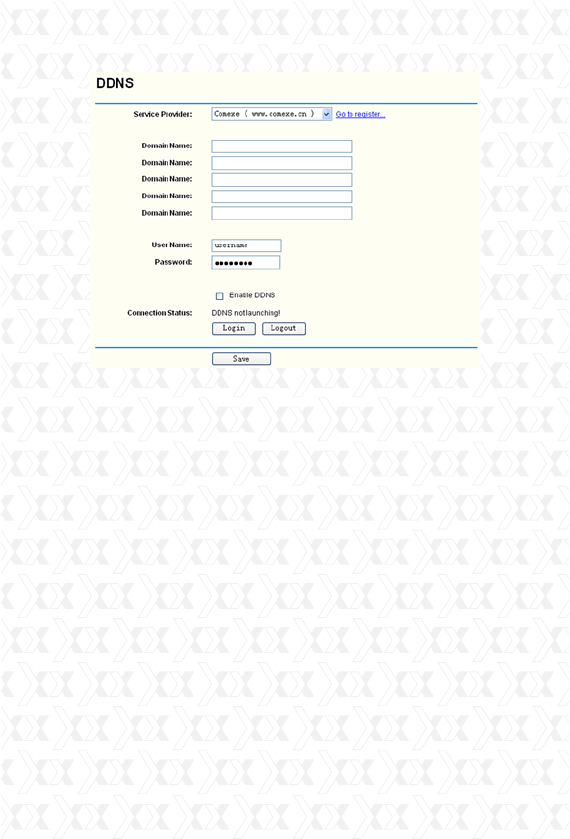
Nexxt Solutions - ACRUX - Wireless N Gigabit Router
115
Figure 4-70 Comexe.cn DDNS Settings
To set up for DDNS, follow these instructions:
1. Type the Domain Name received from your
dynamic DNS service provider.
2. Type the User Name for your DDNS account.
3. Type the Password for your DDNS account.
4. Click the Login button to log into the DDNS
service.
Connection Status -The status of the DDNS service
connection is displayed here.
Click Logout to exit the DDNS service.
4.16.2 Dyndns.org DDNS
If the dynamic DNS Service Provider you select is
www.dyndns.org, the page will appear as shown in
figure 4-71.
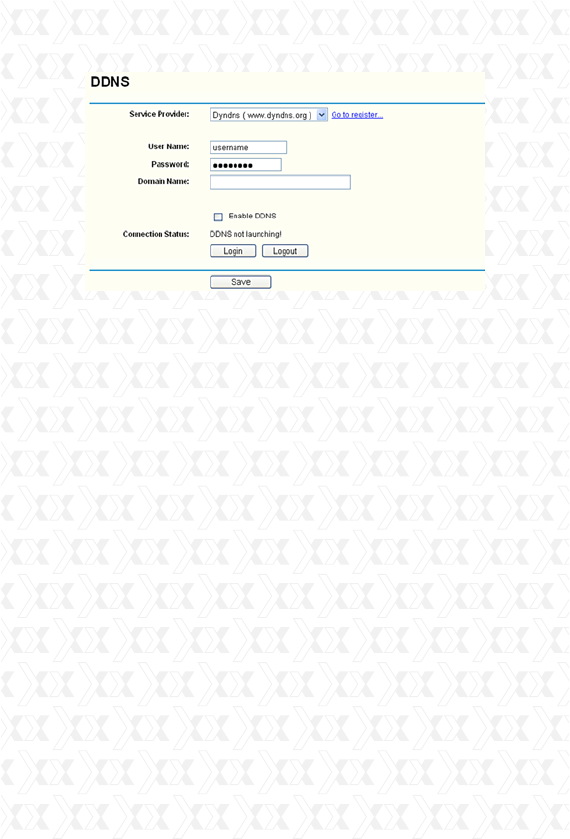
Nexxt Solutions - ACRUX - Wireless N Gigabit Router
116
Figure 4-71 Dyndns.org DDNS Settings
To set up for DDNS, follow these instructions:
1. Type the User Name for your DDNS account.
2. Type the Password for your DDNS account.
3. Type the Domain Name you received from
dynamic DNS service provider here.
4. Click the Login button to log into the DDNS
service.
Connection Status -The status of the DDNS service
connection is displayed here.
Click Logout to exit the DDNS service.
4.16.3 No-ip.com DDNS
If the dynamic DNS Service Provider you select is
www.no-ip.com, the page will appear as shown in
figure 4-72.
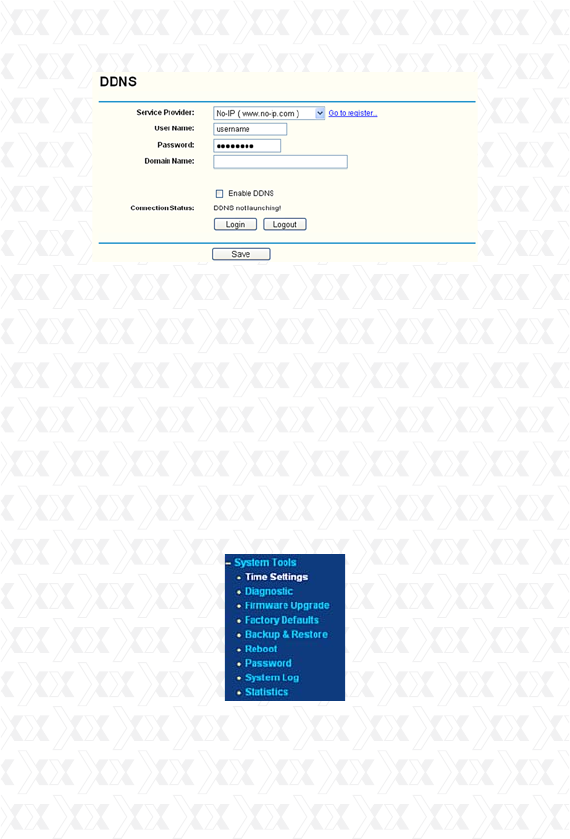
Nexxt Solutions - ACRUX - Wireless N Gigabit Router
117
Figure 4-72 No-ip.com DDNS Settings
Figure 4-73 System Tools menu
To set up for DDNS, follow these instructions:
1. Type the User Name for your DDNS account.
2. Type the Password for your DDNS account.
3. Type the Domain Name you received from
dynamic DNS service provider.
4. Click the Login button to log into the DDNS
service.
Connection Status - The status of the DDNS
service connection is displayed here.
Click Logout to exit the DDNS service.
4.17 System Tools
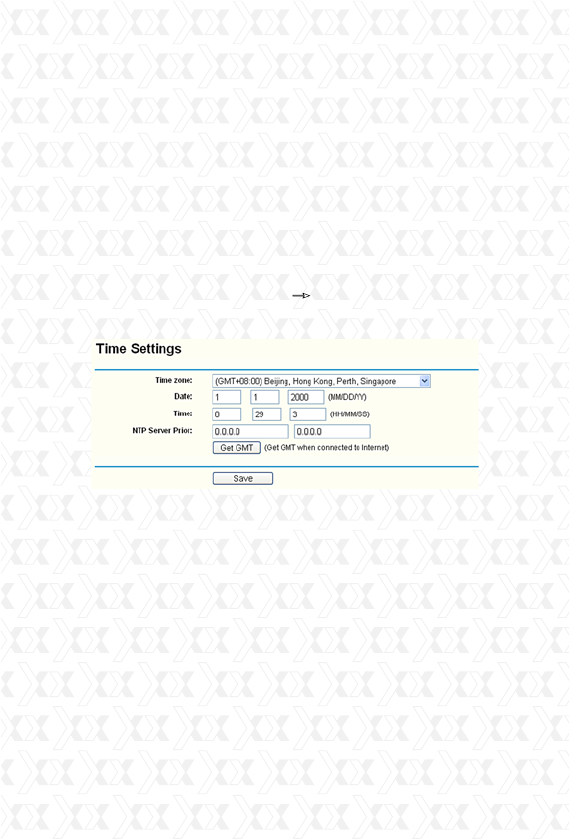
Nexxt Solutions - ACRUX - Wireless N Gigabit Router
118
Figure 4-74 Time settings
Go to “System Tools” in order to display the
submenus under the main menu: Time Settings,
Diagnostic, Firmware Upgrade, Factory Defaults,
Backup & Restore, Reboot, Password, System
Log and Statistics. Click on any of these items in
order to configure the corresponding function.
You will find detailed descriptions for each of these
items below.
4.17.1 Time Setting
Go to menu “System Tools Time Setting”, in
order to configure the time on the following screen.
Time Zone - Select your local time zone from this
pull down list.
Date - Enter your local date in MM/DD/YY into
the corresponding blank fields.
Time - Enter your local time in HH/MM/SS into
the corresponding blank fields.
NTP Server Prior - Enter the address for the NTP
Server, then the router will preferentially obtain
the time from the NTP Server. In addition, the
router can automatically update the time from
any enabled NTP server once it connects to the
Internet.
*
*
*
*

Nexxt Solutions - ACRUX - Wireless N Gigabit Router
119
To configure the system manually:
1. Select your local time zone.
2. Enter date and time in the corresponding blank
fields.
3. Click Save to store your new settings.
To configure the system automatically:
1. Select your local time zone.
2. Enter the IP address for NTP Server Prior.
3. Click the Get GMT button to obtain the system
time from Internet if you are already connected.
Note:
1. This setting will be used for some time-based
functions, such as firewall. You must specify your
time zone once you login to the router successfully;
otherwise, none of these functions will work.
2. The time will be lost if the router is turned off.
3. The router will obtain the GMT automatically from
the Internet as long as it is connected to Internet.
4.17.2 Diagnostic
Go to “System Tools Diagnostic” in the menu,
in order to start the Ping or Traceroute functions,
which are designed to check the connectivity status
of your network, as shown in the screen below.
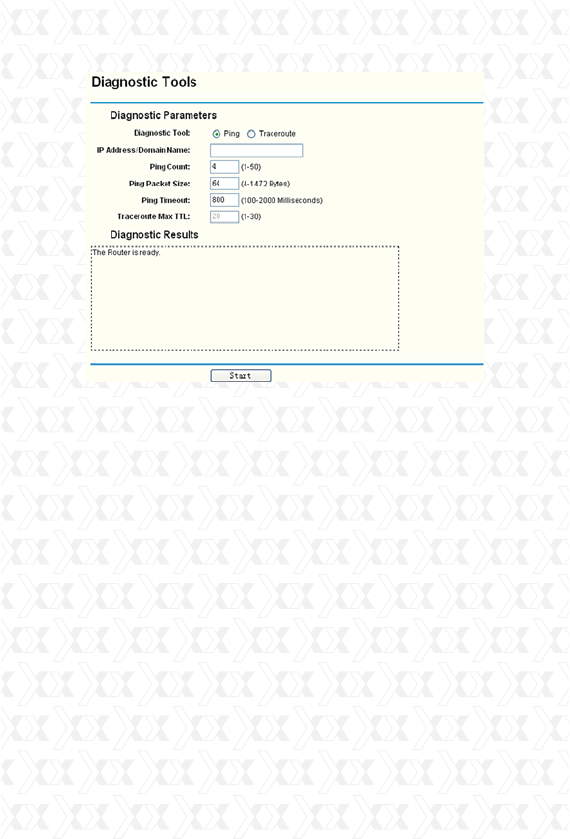
Nexxt Solutions - ACRUX - Wireless N Gigabit Router
120
Figure 4-75 Diagnostic Tools
Diagnostic Tool - Check the radio button to select
one of the diagnostic tools.
sPing - This diagnostic tool troubleshoots
connectivity, reachability, and name resolution
to a given host or gateway.
sTraceroute - This diagnostic tool tests the
performance of a connection.
Note:
You can use ping/traceroute to test both numeric
IP address or domain name. If pinging/tracerout-
ing the IP address is successful, but pinging/trac-
erouting the domain name is not, you might have
a name resolution problem. In this case, make
sure that the domain name you are specifying can
be resolved by using Domain Name System (DNS)
queries.
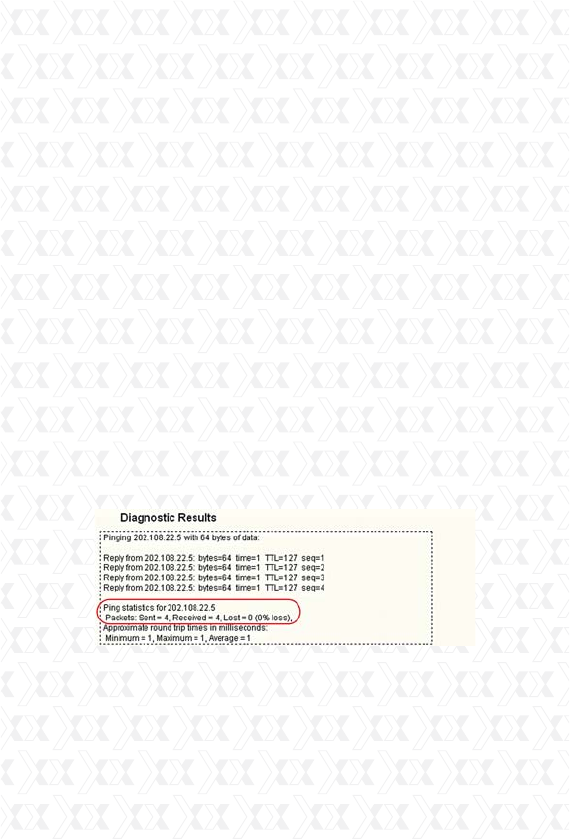
Nexxt Solutions - ACRUX - Wireless N Gigabit Router
121
IP Address/Domain Name - Type the destination IP
address (such as 202.108.22.5) or Domain name
of the PC whose connection you wish to diagnose.
Pings Count - Specifies the number of Echo
Request messages sent. The default is 4.
Ping Packet Size - Specifies the number of data
bytes to be sent. 64 is the default value.
Ping Timeout - Sets the maximum time that the
application will wait for a reply, in milliseconds.
When time exceeds the timeout limit, the session
will expire. 800 is the default value.
Traceroute Max TTL - Sets the maximum number
of hops (max TTL to be reached) in the path to
search for the target (destination). The default
is 20.
Click Start to check the connectivity of the Internet.
The Diagnostic Results page displays the outcome
of the diagnosis.
If the results you obtained are similar to the values
that appear in the screen below, it means that the
connectivity to the Internet is fine.
Note:
Only one user can use this tool at a time. “Number
of Pings”, “Ping Size” and “Ping Timeout” are Ping
parameters. “Tracert Hops” is a Traceroute
parameter.
*
*
*
*
*
Figure 4-76 Diagnostic Results
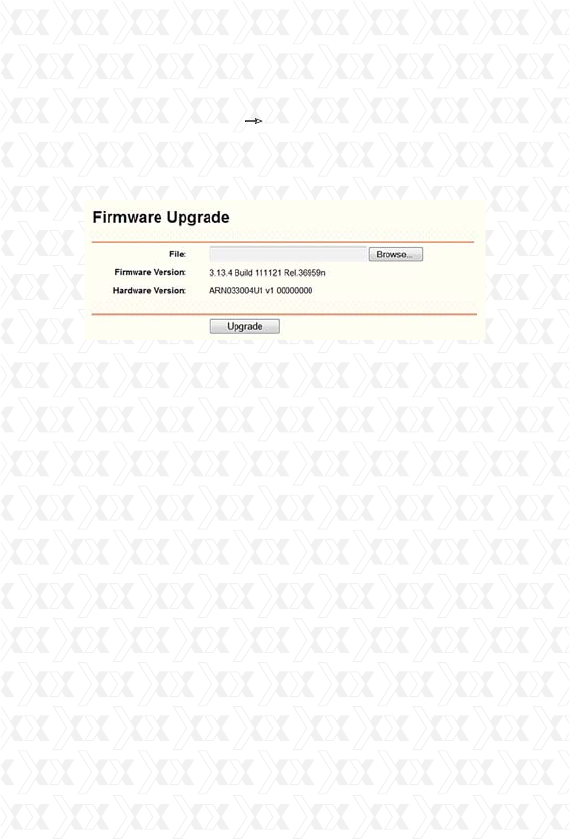
Nexxt Solutions - ACRUX - Wireless N Gigabit Router
122
Firmware Version - The current firmware version
is displayed here.
Hardware Version - The current hardware ver-
sion is displayed here. The hardware version of
the upgrade file must match the router’s current
hardware version.
Download the latest firmware upgrade file from
our website (http://www.nexxtsolutions.com ).
Type or select the path and file name of the
update file into the File field. Or click the Browse
button to locate the update file.
Click the Upgrade button.
New firmware versions are posted at http://
www.nexxtsolutions.com and can be downloaded
for free. There is no need to upgrade the firm-
ware unless the new firmware has a new feature
To upgrade the Router’s firmware, follow the
instructions below:
Note:
4.17.3 Firmware Upgrade
Go to “System Tools Firmware Upgrade” in the
menu, in order to update the latest firmware
version available for the router. The following screen
will be displayed.
*
*
1.
2.
3.
1)
Figure 4-77 Firmware Upgrade
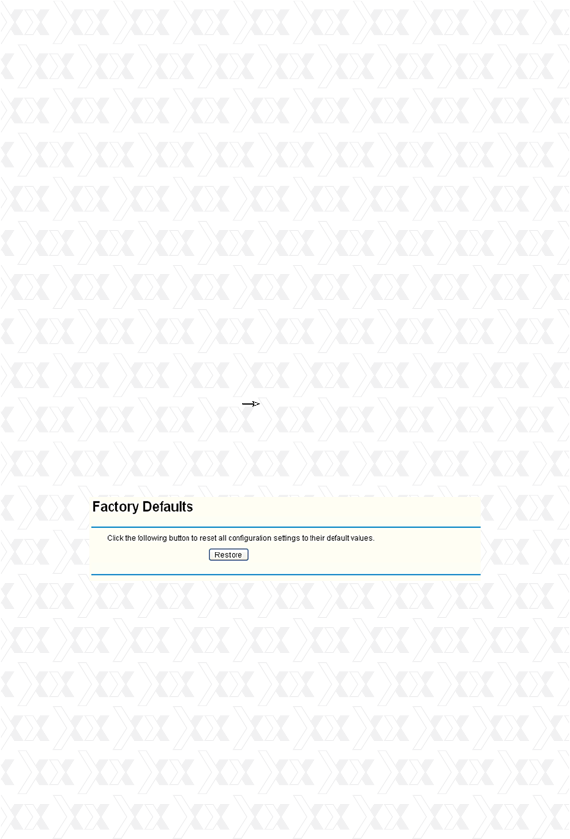
Nexxt Solutions - ACRUX - Wireless N Gigabit Router
123
you want to use. However, when experiencing
problems caused by the router rather than the
configuration, you can try to upgrade the
firmware.
When you upgrade the router’s firmware, you may
lose its current configuration. Therefore, before
upgrading the firmware, please write down your
customized parameters to avoid losing important
settings.
Do not turn off power or press the reset button
while the firmware is being upgraded; doing so
might cause serious damage to the router.
The router will reboot after the upgrading has
been finished.
4.17.4 Factory Defaults
Go to “System Tools Factory Defaults” in the
menu, in order to restore the router configuration
to its factory default values, as seen on the following
screen.
Click the Restore button to reset all settings to their
factory default values.
2)
3)
4)
Figure 4-78 Restore Factory Default
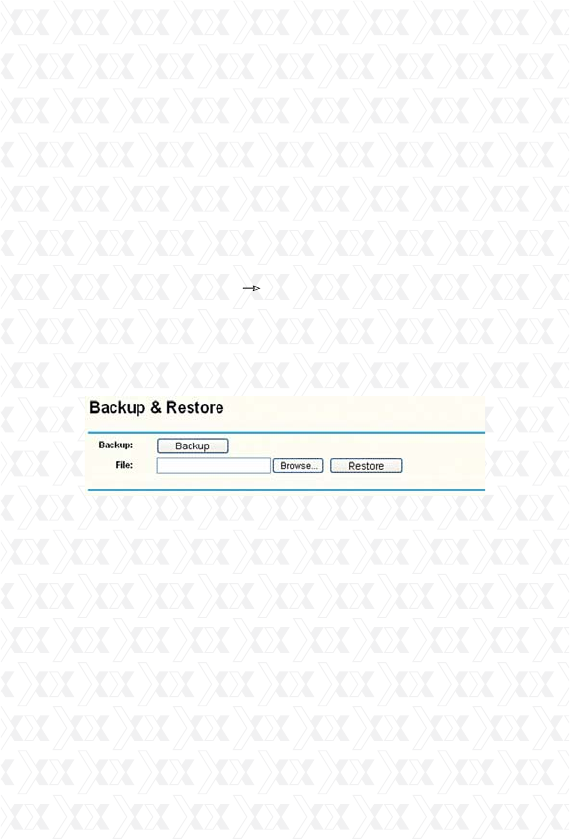
Nexxt Solutions - ACRUX - Wireless N Gigabit Router
124
Click the Backup button to save all configuration
settings as a backup file in your local computer.
To upgrade the Router’s configuration, follow the
instructions below.
s#LICKTHEBrowse… button to locate the update
file for the router, or enter the exact path to the
Setting file in the text box.
s#LICKTHERestore button.
Note:
Any settings you have saved will be lost after the
default settings are restored.
4.17.5 Backup & Restore
Go to “System Tools Backup & Restore” in the
menu, in order to save the current configuration
of the router as a backup file and restore the
original settings using a backup file as shown
in Figure 4-75.
s$EFAULTUser Name: admin
s$EFAULTPassword: admin
s$EFAULTIP Address: 192.168.0.1
s$EFAULTSubnet Mask: 255.255.255.0
*
*
Figure 4-79 Backup & Restore Configuration
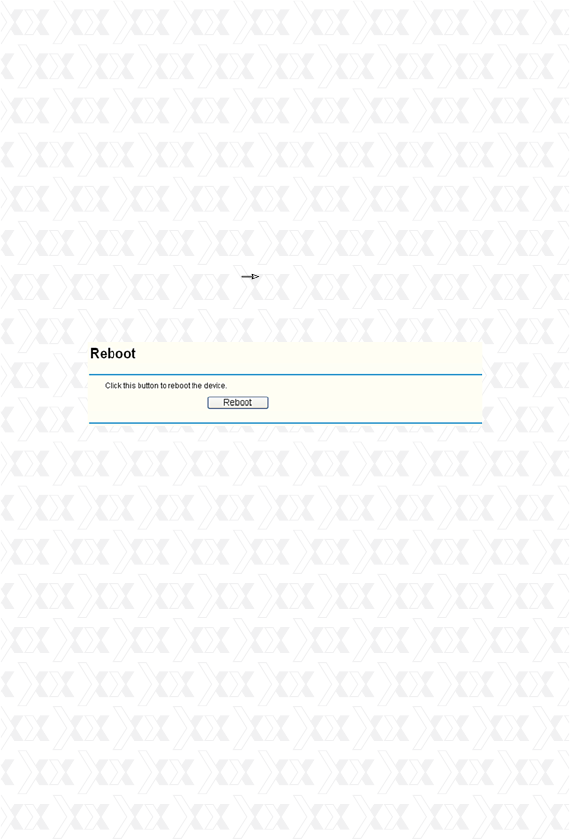
Nexxt Solutions - ACRUX - Wireless N Gigabit Router
125
Note:
The current configuration will be overwritten by the
uploaded configuration file. The upgrade process
lasts around 20 seconds, after which the router will
restart automatically. Keep the router on during the
entire upgrading process to prevent any potential
damage to the unit.
4.17.6 Reboot
Go to “System Tools Reboot”, and press the
Reboot button in order to reset the device, as
shown in the screen below.
Some settings of the Router will only take effect
after rebooting, which include:
Figure 4-80 Reboot the Router
LAN IP Address change (system will reboot
automatically).
DHCP Settings change.
Wireless configuration change.
Web Management Port change.
Upgrade the firmware of the Router (system will
reboot automatically).
Restore the Router’s settings to factory defaults
(system will reboot automatically).
Update the configuration with the file (system will
reboot automatically).
s
s
s
s
s
s
s
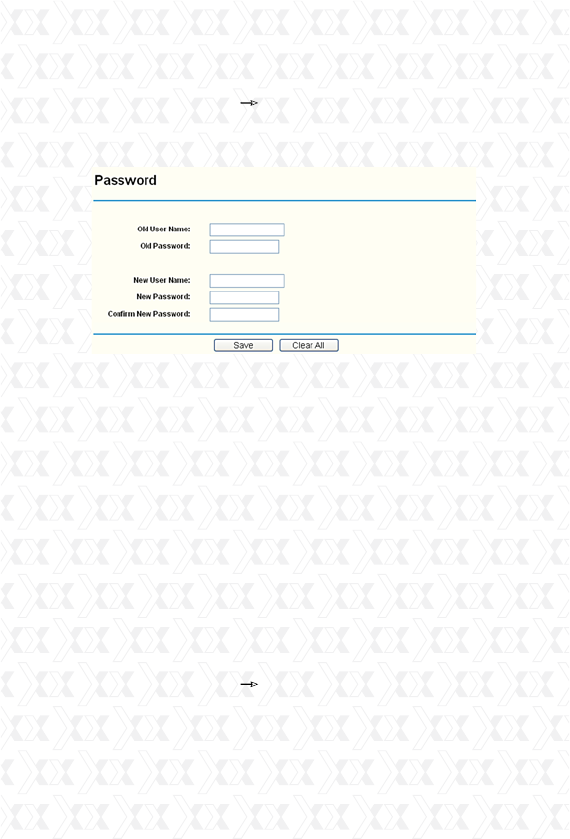
Nexxt Solutions - ACRUX - Wireless N Gigabit Router
126
It is strongly recommended that you change the fac-
tory default user name and password of the router.
All users who try to access the Router’s Web-based
utility or Quick Setup will be prompted to type the
router’s default user name and password.
Note:
The new user name and password must not exceed
14 characters in length and must not include any
spaces. Enter the new Password twice to confirm.
Click the Save button when finished.
Click the Clear All button to erase all entries.
4.17.8 System Log
Go to “System Tools System Log”, in order to
view the logs of the router.
4.17.7 Password
Go to “System Tools Password”, in order to
change the router’s factory default user name and
password, using the screen shown in figure 4-81.
Figure 4-81 Password
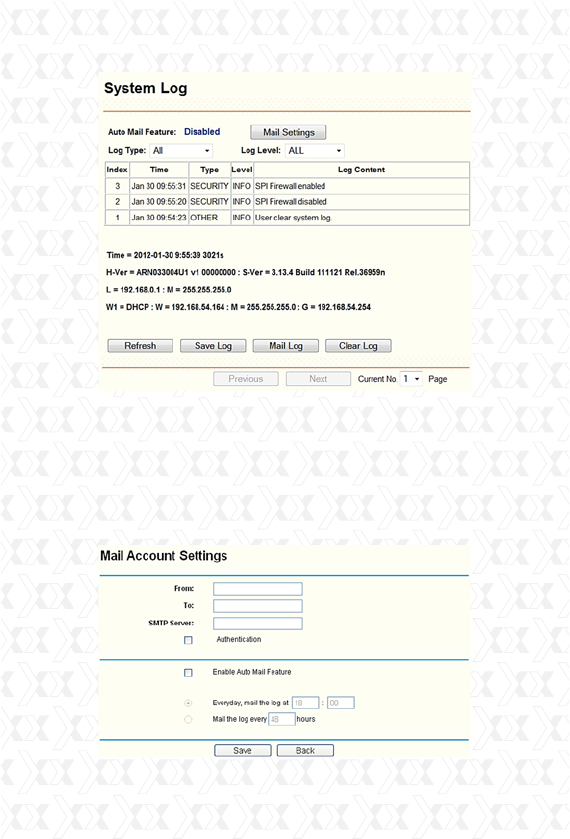
Nexxt Solutions - ACRUX - Wireless N Gigabit Router
127
Figure 4-82 System Log
Figure 4-83 Mail Account Settings
Auto Mail Feature - Indicates whether the
automatic mail feature is enabled or not.
Mail Settings - Set the receiving and sending
mailbox address, server address, validation
information as well as the timetable for Auto Mail
Feature, as shown in figure 4-83.
*
*

Nexxt Solutions - ACRUX - Wireless N Gigabit Router
128
Click Save to keep your settings.
Click Back to return to the previous page.
From - Your mail box address. The email account
the router will use to send logging messages.
To - The recipient’s address. The destination
mailbox where the logs would be received.
SMTP Server - Your SMTP server. The mail
server which will be used for sending emails
using the address you entered in the From field.
You can log into the applicable website for Help if
you are unsure about the address.
Authentication - Most SMTP servers require
authentication. It is required by most mailboxes
that need User Name and Password to log in.
Note:
Only when you select Authentication, you have
to enter the User Name and Password in the
following fields.
User Name - Your mail account name entered
in the From field. The part following the @ is
excluded.
Password - Your email account password.
Confirm The Password - Enter the password
again to confirm.
Enable Auto Mail Feature - Select it to mail logs
automatically. You could mail the current logs
either at a specified time every day or at
intervals, but only one rule can be can be
effective at a time. Enter the desired time or
intervals in the corresponding field, as shown
in figure 4-83.
s
s
s
s
s
s
s
s
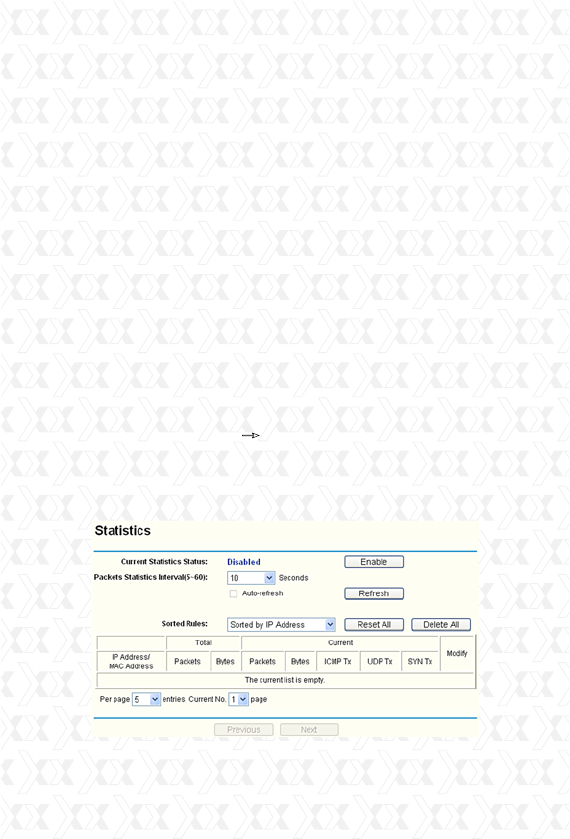
Nexxt Solutions - ACRUX - Wireless N Gigabit Router
129
Log Type - By selecting the log type, only logs of
this type will be shown.
Log Level - By selecting the log level, only logs of
this level will be shown.
Refresh - Refresh the page to show the latest log
list.
Save Log - Click to save all the logs in a txt file.
Mail Log - Click to send an email of current logs
manually according to the address and validation
information set in Mail Settings.
Clear Log - All the logs will be deleted from the
router permanently, not just from the page.
Click the Next button to go to the following page, or
click the Previous button return to the last page.
4.17.9 Statistics
Go to “System Tools Statistics” in the menu, in
order to visualize the router statistics, including the
total traffic and current traffic of the last Packets
Statistic Interval.
*
*
*
*
*
*
Figure 4-84 Statistics

Nexxt Solutions - ACRUX - Wireless N Gigabit Router
130
Current Statistics Status - Enable or Disable.
The default value is disabled. To activate it, click
the Enable button.
Packets Statistics Interval (5-60) - The default
value is 10. Select a value between 5 and 60
seconds from the pull-down list. This statistics
interval defines the time between each
transmission of data packets.
Sorted Rules - Select a rule from the pull-down
list to display the corresponding statistics.
Statistics Table:
Select the Auto-refresh checkbox to update data
automatically.
Click the Refresh button to update data
immediately.
Click Reset All to restore the values of all the
entries to zero.
Click Delete All to erase all entries in the table.
There would be 5 entries on each page.
Click Previous to return to the last page and Next
to go to the following page.
*
*
*
IP/MAC Address The IP/MAC Address displayed with statistics
The total amount of packets received and transmitted by the router
The total amount of bytes received and transmitted by the router
The total amount of packets received and transmitted in the
last Packets Statistic interval expressed in seconds.
The total amount of the ICMP packets transmitted to WAN
in the last Packets Statistic interval expressed in seconds
The total amount of the UDP packets transmitted to WAN
in the last Packets Statistic interval expressed in seconds
The total amount of the TCP SYN packets transmitted to WAN
in the last Packets Statistic interval expressed in seconds
The total amount of bytes received and transmitted in the
last Packets Statistic interval expressed in seconds.
Total
Packets
Bytes
Packets
Bytes
ICMP Tx
UDP Tx
TCP
SYN Tx
Current
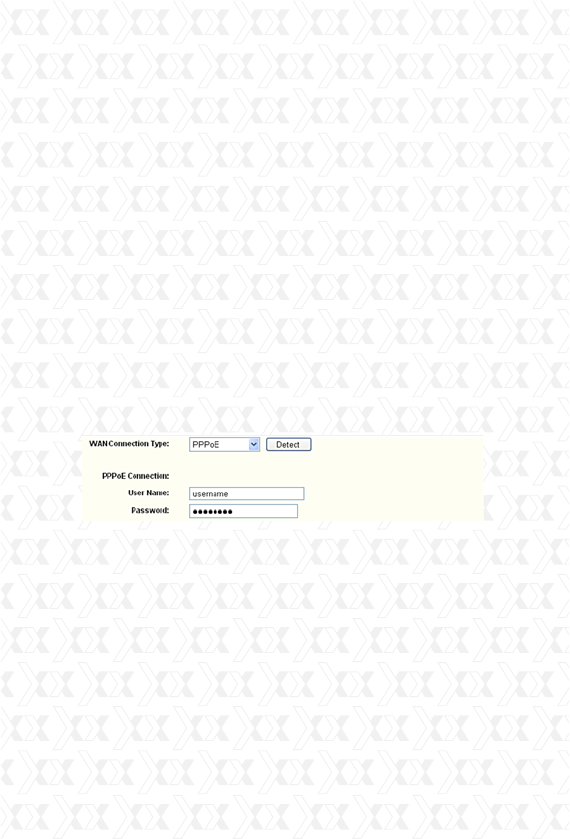
Nexxt Solutions - ACRUX - Wireless N Gigabit Router
131
Appendix A: FAQ
1. How do I configure the Router to access
Internet by ADSL users?
First, configure the ADSL modem in the RFC1483
bridge mode.
Connect the Ethernet cable from your ADSL
modem to the WAN port on the router. The
telephone cord must be plugged into the “Line”
port of the ADSL modem.
Login to the router. Go to the “Network” in the
menu located on the left of your browser, and
select “WAN” in the submenu. Once the WAN
page opens, select “PPPoE” as the WAN
Connection Type. Type the “User Name” and
“Password” in the corresponding fields, and
finish by clicking on the “Connect” button.
If your ADSL access rates are “based on
connection time”, select “Connect on Demand” or
“Connect Manually” as your Internet connection
mode. Type an appropriate number for “Max Idle
Time” to avoid wasting paid time. Otherwise, you
can select “Auto-connecting” as your Internet
connection mode.
1)
2)
3)
4)
Figure A-1 PPPoE Connection Type
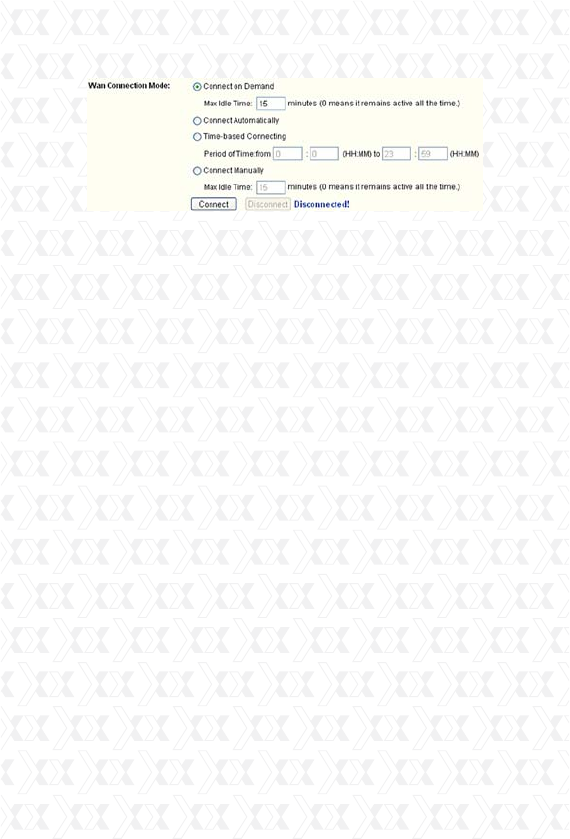
Nexxt Solutions - ACRUX - Wireless N Gigabit Router
132
2. How do I configure the router for Ethernet
users to access the Internet?
Note:
Login to the router. Go to the “Network” in the
menu located on the left of your browser, and
select “WAN” in the submenu. Once the WAN
page opens, select “Dynamic IP” as the WAN
Connection Type, and finish by clicking on the
“Save” button.
Some ISPs require that you register the MAC
Address of your adapter, which is connected to
your cable/DSL modem during installation. If your
ISP requires MAC register, login to the router
and click on the “Network” menu link on the left
of your browser, before selecting “MAC Clone” in
the submenu. On the “MAC Clone” page, if your
PC’s MAC address is a proper MAC address, click
the “Clone MAC Address” button and your PC’s
Sometimes the connection cannot be terminated
despite your setting of the ”Max Idle Time”
interval. This is due to some applications are con-
tinually linked to the internet in the background.
If you are a cable user, you must configure the
router following the above steps.
1)
2)
i.
ii.
Figure A-2 PPPoE Connection Mode
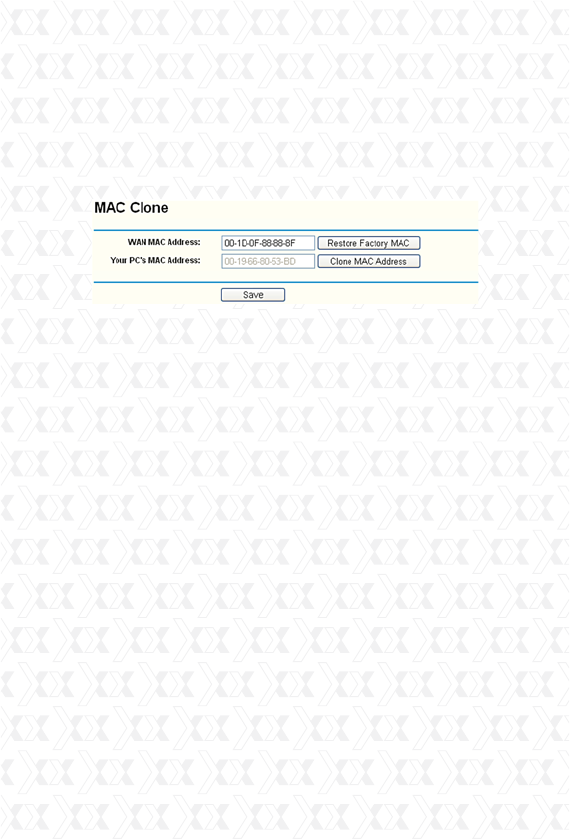
Nexxt Solutions - ACRUX - Wireless N Gigabit Router
133
MAC address will be copied into the “WAN MAC
Address” field. Or you may type the MAC Address
directly into the “WAN MAC Address” field. The
MAC Address format is XX-XX-XX-XX-XX-XX. Click
the “Save” button when you are done. This setting
will be effective only after the router has rebooted.
If you start Netmeeting as a host, you don’t need
to do anything with the router.
If you start as a response, you need to configure
the Virtual Server or DMZ Host and make sure
the H323 ALG is enabled.
How to configure the Virtual Server: Log in to
the router, go to the “Forwarding” menu located
on the left of your browser, and then select
“Virtual Servers” submenu. On the “Virtual
Servers” page, click Add New…. Once the “Add
or Modify a Virtual Server Entry” page opens,
enter “1720” in the “Service Port” blank field, and
your IP address in the corresponding field, using
192.168.0.169 as an example. Remember to
Enable and Save your settings at the end.
3. I want to use Netmeeting, what do I need
to do?
1)
2)
3)
Figure A-3 MAC Clone
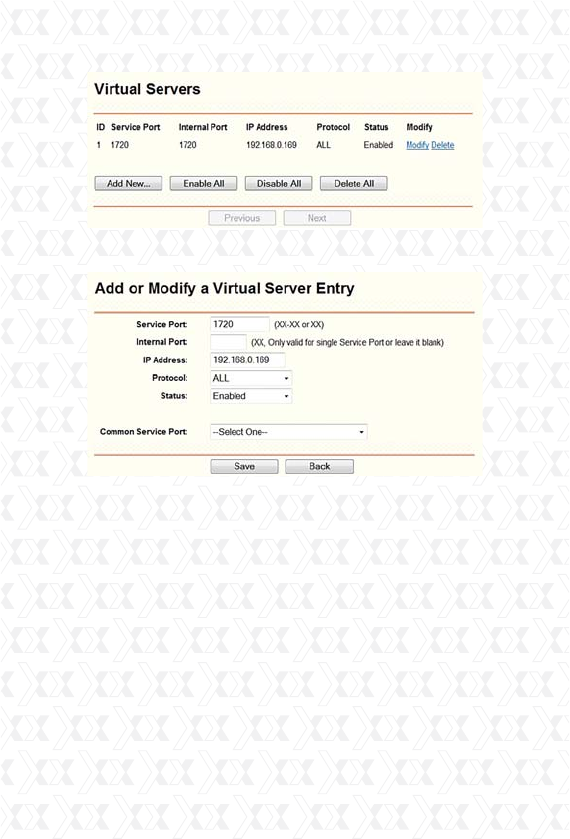
Nexxt Solutions - ACRUX - Wireless N Gigabit Router
134
Figure A-4 Virtual Servers
Figure A-5 Add or Modify a Virtual server Entry
Note:
How to enable DMZ Host: Log in to the Router,
go to the “Forwarding” menu located on the
left of your browser, and then select the “DMZ”
submenu. On the “DMZ” page, click Enable radio
button and type your IP address into the “DMZ
Host IP Address” field, using 192.168.0.169
as an example. Remember to Save your settings
when you are done.
The caller on the other end should call your WAN IP,
which is displayed on the “Status” page.
1)
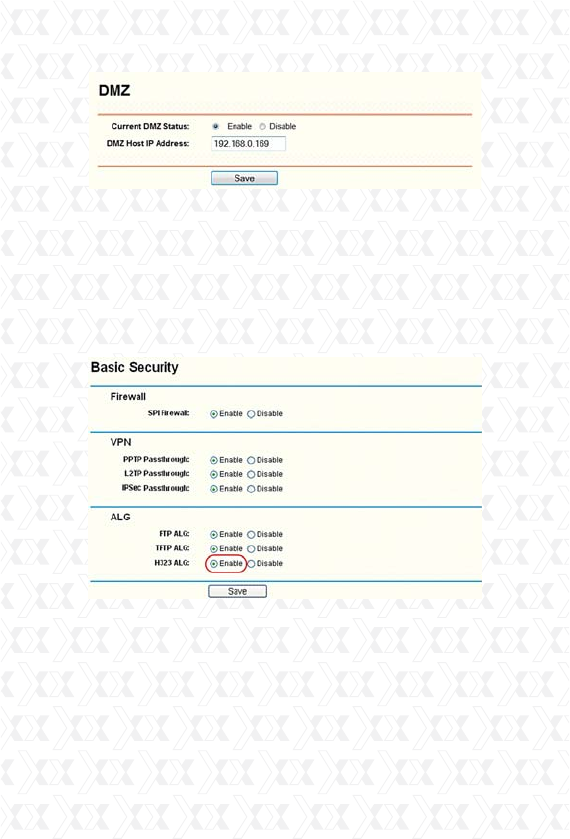
Nexxt Solutions - ACRUX - Wireless N Gigabit Router
135
Figure A-6 DMZ
Figure A-7 Basic Security
How to enable H323 ALG: Log in to the Router,
go to the “Security” menu located on the left of
your browser, and then select the “Basic Secu-
rity” submenu. On the “Basic Security” page,
check the Enable radio button next to H323 ALG.
Remember to click the Save button at the end.
2)
Because the WEB Server port 80 will interfere
with the WEB management port 80 on the
router, you must change the WEB management
port number to avoid interference.
4. I want to build a WEB Server on the LAN, what
should I do?
1)
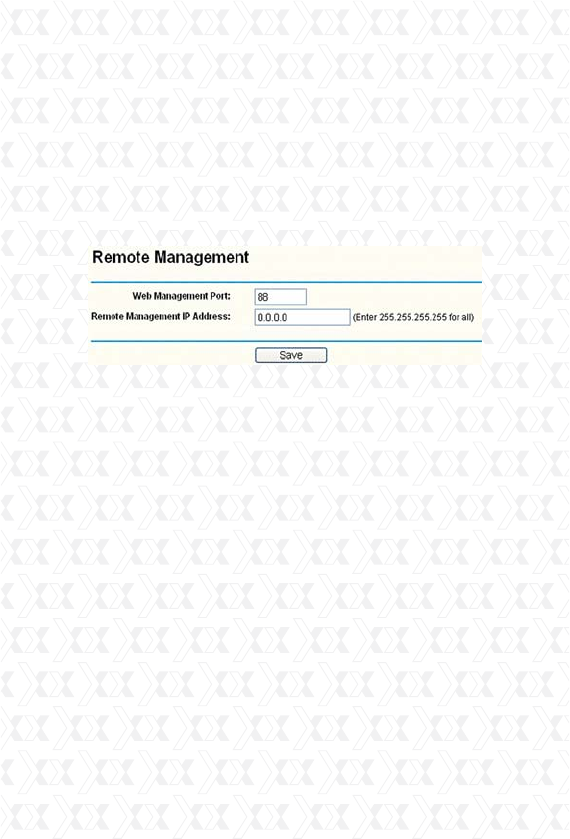
Nexxt Solutions - ACRUX - Wireless N Gigabit Router
136
Figure A-8 Remote Management
2)To change the WEB management port number:
Log in to the router, go to the “Security” menu
located on the left of your browser, and select
the “Remote Management” submenu. On the
“Remote Management” page, type any port
number other than 80, such as 88, into the
“Web Management Port” field. Click Save and
reboot the Router.
2)
Note:
Log in to the Router, go to the “Forwarding” menu
located on the left of your browser, and select
the “Virtual Servers” submenu. On the “Virtual
Servers” page, click Add New…, then on the
“Add or Modify a Virtual Server” page, enter
“80” into the blank field next to the “Service
Port”, and your IP address next to the “IP
Address”, taking 192.168.0.188 as an example.
Remember to Enable and Save your settings at
the end.
If the above settings take effect, type
http://192.168.0.1:88 (the router’s LAN IP
address: Web Management Port) in the address
field of the Web browser in order to configure to
the router.
1)
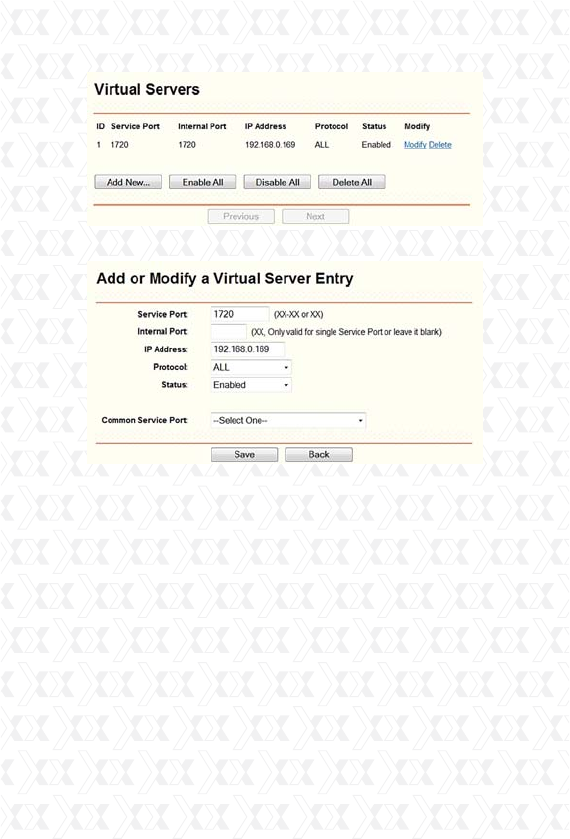
Nexxt Solutions - ACRUX - Wireless N Gigabit Router
137
Figure A-9 Virtual Servers
Figure A-10 Add or Modify a Virtual server Entry
Make sure the “Wireless Router Radio” is
enabled.
Make sure that the wireless stations’ SSID
matches the Router’s SSID.
Make sure the wireless stations have chosen
the right encryption KEY when the router is
encrypted.
If the wireless connection is available, but you are
unable to access the router, check the IP Address
of your wireless stations.
5. The wireless stations cannot connect to
the Router.
1)
2)
3)
4)
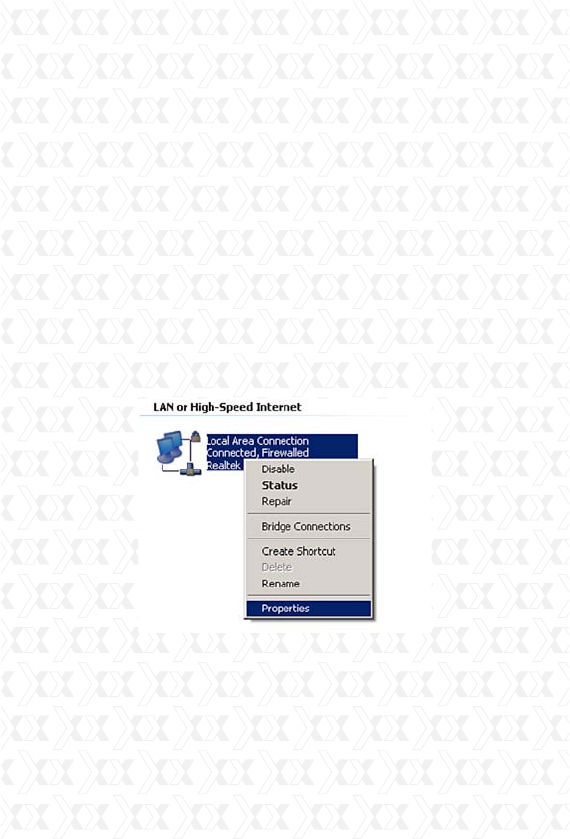
Nexxt Solutions - ACRUX - Wireless N Gigabit Router
138
On the Windows taskbar, click the Start button,
point to Settings, and then select Control Panel.
After clicking the Network and Internet
Connections icon, select the Network
Connections tab in the new window.
Right click the icon displayed below, and select
Properties on the pop up menu.
In the page displayed below, double click on
Internet Protocol (TCP/IP).
Figure B-1
Appendix B: Configuring the PCs
In this section, we will explain how to install and
configure the TCP/IP correctly in Windows XP. First,
make sure your Ethernet Adapter is working. Refer
to the adapter’s manual for further information, if
needed.
1. Install TCP/IP component
1)
2)
3)
4)
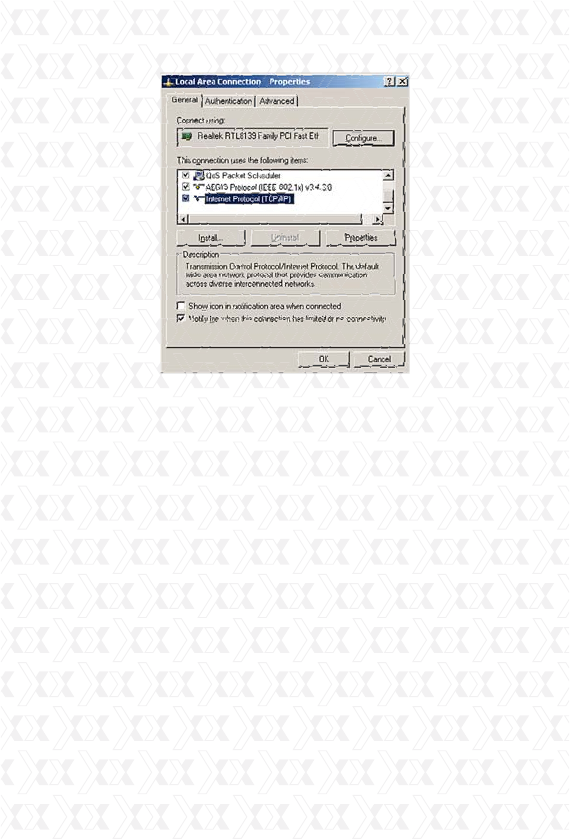
Nexxt Solutions - ACRUX - Wireless N Gigabit Router
139
Figure B-2
The following TCP/IP Properties window will be
displayed, with IP Address tab open by default.
Setting IP address automatically
Now you have two ways to configure the TCP/IP
protocol, as described below:
Select Obtain an IP address automatically, and
then choose Obtain DNS server automatically, as
shown in the figure below:
5)
*
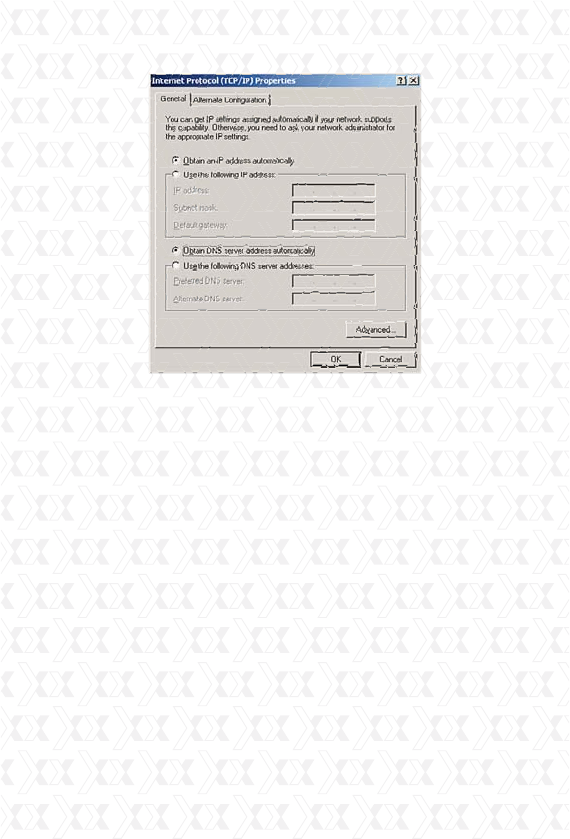
Nexxt Solutions - ACRUX - Wireless N Gigabit Router
140
Figure B-3
Select Use the following IP address radio button.
The following items will be available:
If the Router’s LAN IP address is 192.168.0.1,
type IP address 192.168. 0.x (whereby x is
any value from 2 to 254), and Subnet mask is
255.255.255.0.
Type the Router’s LAN IP address (the default IP
is 192.168. 0.1) into the Default gateway field.
Select Use the following DNS server addresses
radio button. In the Preferred DNS Server field,
you can type the DNS server IP address, which
has been provided by your ISP.
Setting IP address manually
1.
2.
3.
4.
*
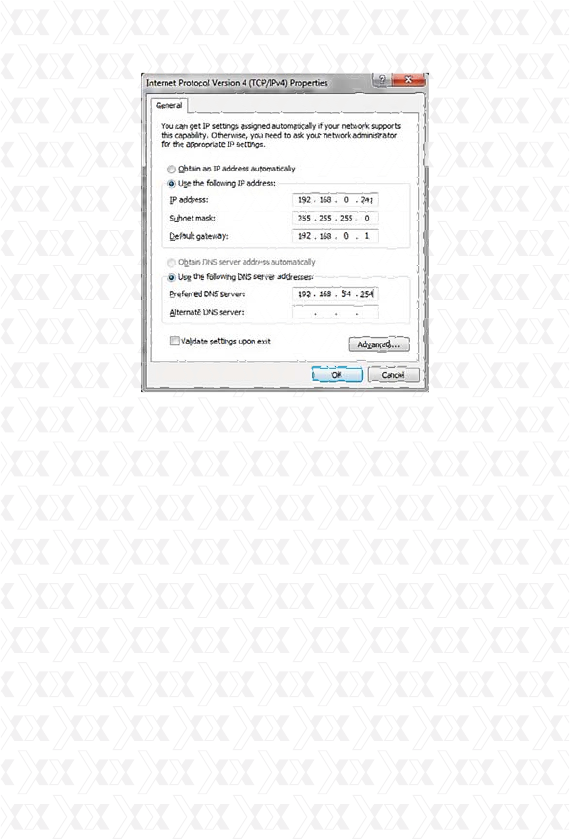
Nexxt Solutions - ACRUX - Wireless N Gigabit Router
141
Figure B-4

Nexxt Solutions - ACRUX - Wireless N Gigabit Router
142
Appendix C: Specifications
IEEE 802.3, 802.3u, 802.3ab, 802.11b, 802.11g and 802.11nStandards
Power, System, WLAN, WAN, LAN (1-4), USB, WPSLEDs
FCCSafety & Emissions
2.4~2.4835GHz
11n:up to 300Mbps(Automatic)
11g:54/48/36/24/18/12/9/6Mbps(Automatic)
11b:11/5.5/2/1Mbps(Automatic)
Frequency Band
13Channels
DSSS(Direct Sequence Spread Spectrum)Frequency Expansion
DBPSK, DQPSK, CCK, OFDM, 16-QAM, 64-QAMModulation
WEP/WPA/WPA2/WPA2-PSK/WPA-PSKSecurity
20dBm (max)RF Power
Operating : 0ºC~40ºC (32ºF~104ºF)
Storage: -40ºC~70ºC(-40ºF~158ºF)
Temperature
Operating: 10% - 90% RH, Non-condensing
Storage: 5% - 90% RH, Non-condensing
Humidity
3dBi per antenna (3)Antenna Gain
270M:
130M:
108M:
54M:
11M:
6M:
1M:
-68dBm@10% PER;
-68dBm@10% PER
-68dBm@10% PER;
-68dBm@10% PER
-85dBm@8% PER;
-88dBm@10% PER
-90dBm@8% PER
Sensitivity
Radio Data Rate
TCP/IP, PPPoE, DHCP, ICMP, NAT, SNTP
10BASE-T: UTP category 3, 4, 5 cable (maximum 100m)
EIA/TIA-568 100Ω STP (maximum 100m)
100BASE-TX: UTP category 5, 5e cable (maximum 100m)
EIA/TIA-568 100Ω STP (maximum 100m)
1000BASE-TX: UTP category 5, 5e cable (maximum 100m)
EIA/TIA-568 100Ω STP (maximum 100m)
Protocols
Ports
Cabling Type
General
Wireless
Environmental and Physical
One 10/100/1000M Auto-Negotiation WAN RJ45 port. Four
10/100/1000M Auto-Negotiation LAN RJ45 ports supporting
Auto MDI/MDIX. One USB2.0 port

Nexxt Solutions - ACRUX - Wireless N Gigabit Router
143
Appendix D: Glossary
802.11n - 802.11n builds upon previous 802.11
standards by adding MIMO (multiple-input multiple-
output). MIMO uses multiple transmitter and
receiver antennas to allow for increased data
throughput via spatial multiplexing and increased
range by exploiting the spatial diversity, perhaps
through coding schemes like Alamouti coding.
The Enhanced Wireless Consortium (EWC) [3]
was formed to help accelerate the IEEE 802.11n
development process and promote a technology
specification for interoperability of next-generation
wireless local area networking (WLAN) products.
802.11b - The 802.11b standard specifies a
wireless networking at 11 Mbps using direct-
sequence spread-spectrum (DSSS) technology
and operating in the unlicensed radio spectrum
at 2.4GHz, and WEP encryption for security.
802.11b networks are also referred to as Wi-Fi
networks.
802.11g - Specification for wireless networking at
54 Mbps using direct-sequence spread-spectrum
(DSSS) technology, using OFDM modulation and
operating in the unlicensed radio spectrum at
2.4GHz, and backward compatibility with IEEE
802.11b devices, and WEP encryption for
security.
DDNS (Dynamic Domain Name System) - The
capability of assigning a fixed host and domain
name to a dynamic Internet IP Address.
DHCP (Dynamic Host Configuration Protocol) -
A protocol that automatically configure the TCP/
IP parameters for the all the PC(s) that are con-
nected to a DHCP server.
*
*
*
*
*

Nexxt Solutions - ACRUX - Wireless N Gigabit Router
144
DMZ (Demilitarized Zone) - A Demilitarized Zone
allows one local host to be exposed to the Internet
for a special-purpose service such as Internet
gaming or videoconferencing.
DNS (Domain Name System) - An Internet
Service that translates the names of websites into
IP addresses.
Domain Name - A descriptive name for an
address or group of addresses on the Internet.
DSL (Digital Subscriber Line) - A technology that
allows data to be sent or received over existing
traditional phone lines.
ISP (Internet Service Provider) - A company that
provides access to the Internet.
MTU (Maximum Transmission Unit) - The size in
bytes of the largest packet that can be transmit-
ted.
NAT (Network Address Translation) - NAT
technology translates IP addresses of a local area
network to a different IP address for the Internet.
PPPoE (Point to Point Protocol over Ethernet) -
PPPoE is a protocol for connecting remote hosts
to the Internet over an always-on connection by
simulating a dial-up connection.
SSID - A Service Set Identification is a thirty-two
character (maximum) alphanumeric key
identifying a wireless local area network. For the
wireless devices in a network to communicate
with each other, all devices must be configured
with the same SSID. This is typically the
configuration parameter for a wireless PC card.
It corresponds to the ESSID in the wireless
Access Point and to the wireless network name.
*
*
*
*
*
*
*
*
*

Nexxt Solutions - ACRUX - Wireless N Gigabit Router
145
WEP (Wired Equivalent Privacy) - A data privacy
mechanism based on a 64-bit or 128-bit or
152-bit shared key algorithm, as described in the
IEEE 802.11 standard.
Wi-Fi - A trade name for the 802.11b wireless
networking standard, given by the Wireless
Ethernet Compatibility Alliance (WECA, see
http://www.wi-fi.net), an industry standards
group promoting interoperability among 802.11b
devices.
WLAN (Wireless Local Area Network) - A group
of computers and associated devices communi-
cate with each other wirelessly, in which network
serving users are limited in a local area.
*
*
*